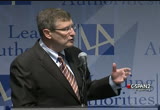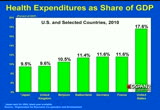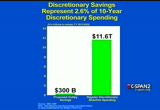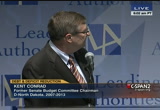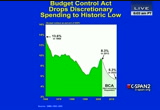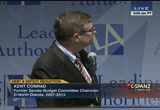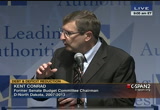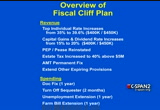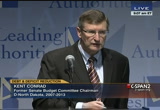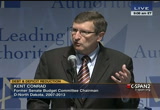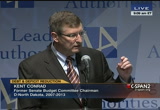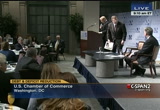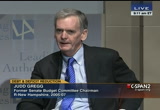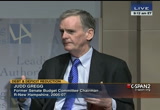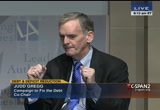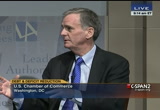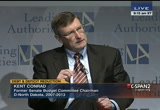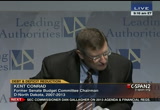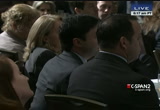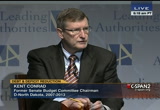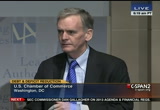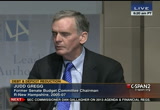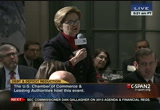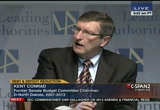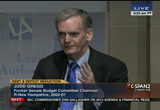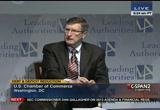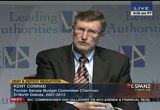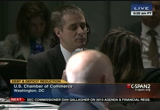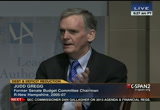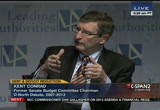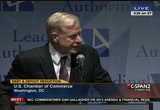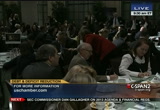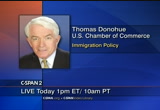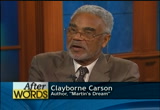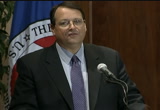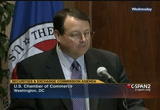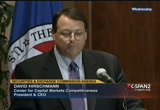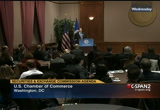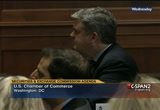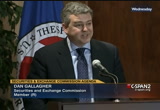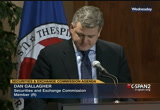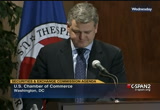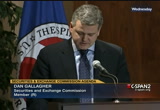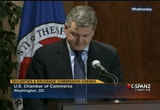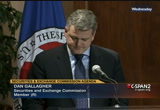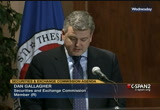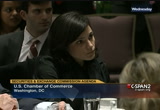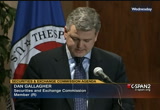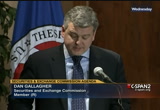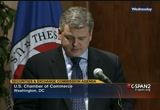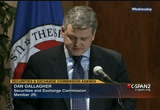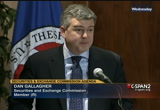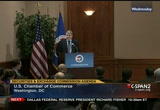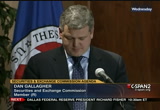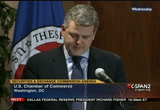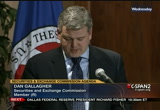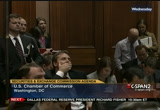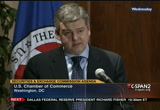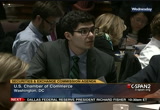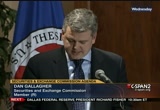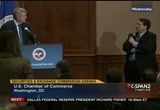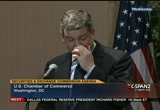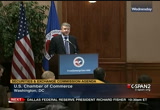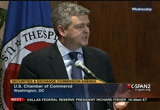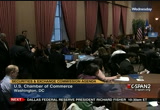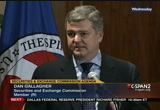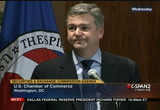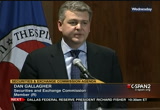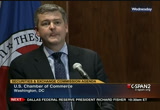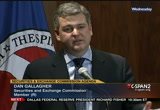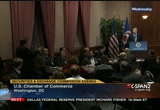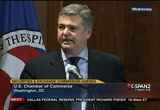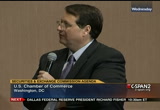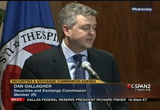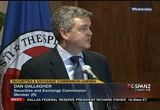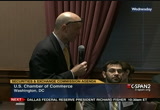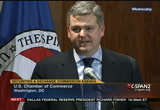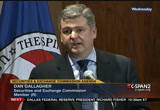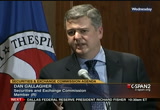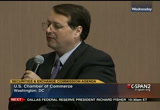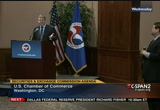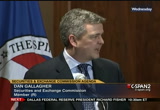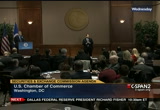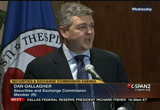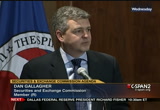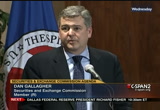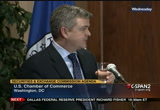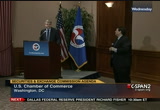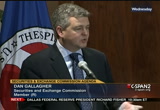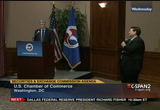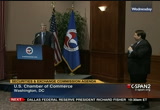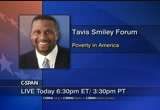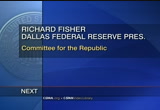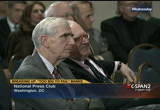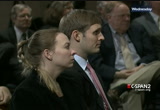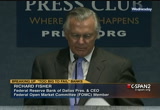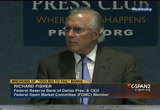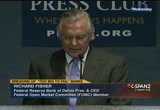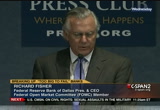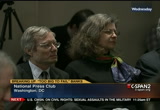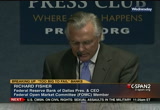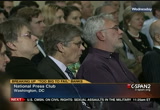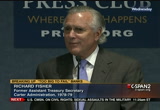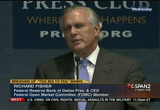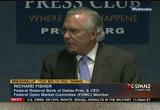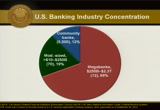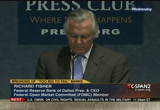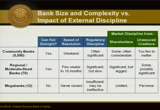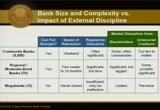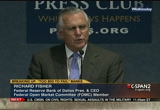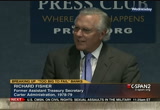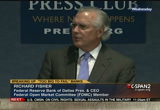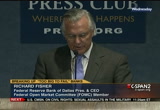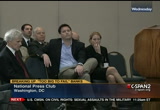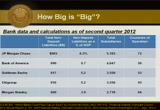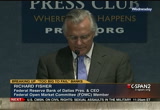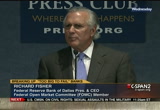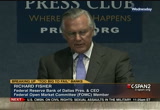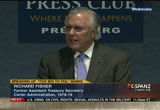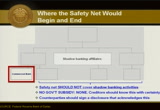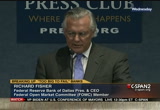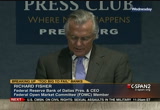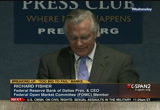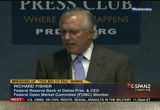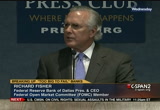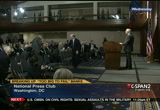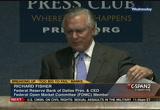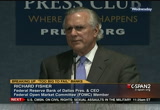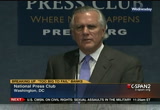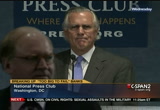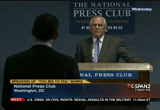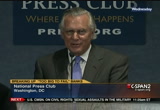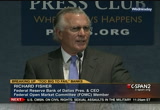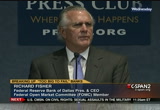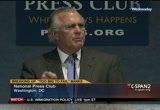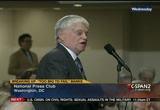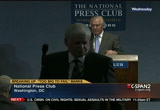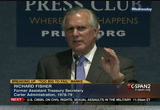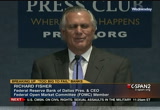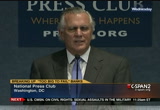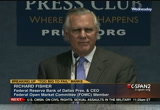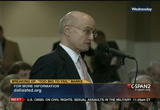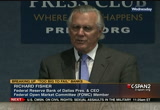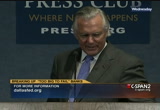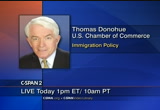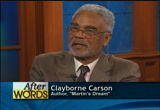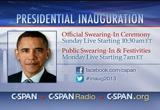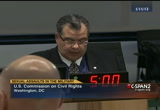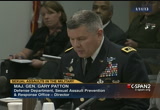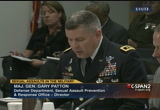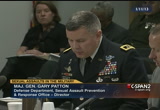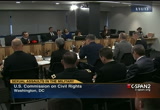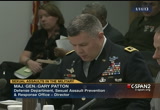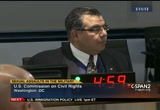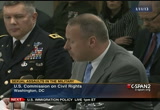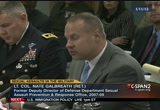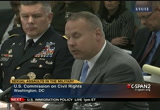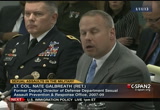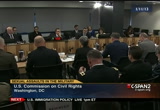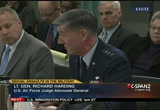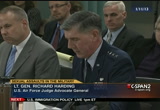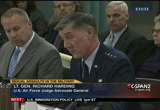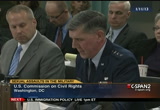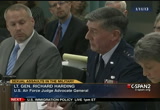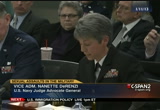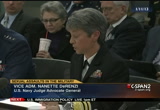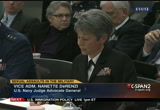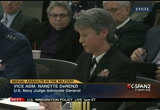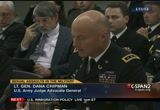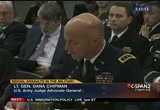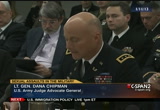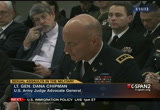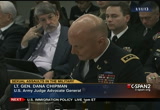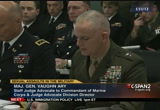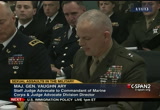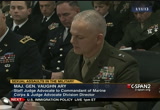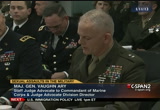tv U.S. Senate CSPAN January 17, 2013 9:00am-12:00pm EST
9:00 am
let's take the savings that the speaker was proposing on health care, he said 500 billion over 10 years. again, if we put that in context, we're going to spend over $11 trillion on health care. so the spending proposal that the speaker made represents 4.5% of health care spending over the next 10 years. we can't say for%? really? what company in american face with the circumstance that we have would say oh, no, that's too tough, we can't save 4%. yes weekend. let's go to the next slide. you know, especially if you put in contest where we are with health care expenditures in the world, the most recent year for which we have comparisons with other countries was 2010. we know that we are now over 18% of gdp on health care in this country.
9:01 am
nobody else is more than 11.5. so the idea that we can't have additional savings and health care and not hurt anybody is preposterous. we absolutely can have savings in health care. and by the way, when you savings in health care, 40% of the savings flows through the federal government and federal programs. because federal government is funding 40% of the health care in this country. so we have big savings in health care. we have big savings for the federal government. discretionary savings, the speaker proposed 300 billion over 10 years. again, if we put that in context are going to spend $11.6 trillion over the next 10 years. so that would represent a savings of 2.6%. as judd indicated we've already had and the budget control act 900 billion of savings, so there are substantial savings that have already occurred in this
9:02 am
area. but we can do another 300 billion. we could save another 2.6%. other mandatory, that's the other major category. again, speaker proposed $200 billion over 10 years. we are going to spend $11 trillion -- i'm sorry, $511 trillion in this category over the next 10 years. so that represents a 10 a savings of 4%. you know, what have we become as a country if we can't make a 4% change? really, that is something we should be able to do. so under the compromise that i proposed, taking the speakers numbers, taking the president's revenue, you can see how it racks up to a total of over $4 trillion of savings over 10 years, which is, as i indicated, what virtually every economist
9:03 am
says is necessary to get us back on track. now, we are borrowing 31 cents of every dollar we spend, but we are also on a long-term path, judd knows so well, according to the congressional budget office, if we failed to act we are headed for a debt that will be 100% of our gdp, it will be 200% of our gdp. so there is incredible and to act here. not just together and delay and awful, but to act. the budget control act has already dropped discretionary spending to historic lows. you can see under the budget control act we're going to go down to 523% of gdp going to discretionary spending, down from 8.3% last year. 13.6%. we are already have made very substantial changes on the
9:04 am
discretion side of the house. where we really need to focus these health care -- judd make this point -- medicaid, medicare, other federal health spending as a percentage of gdp. going back to 1972, looking forward to 2050, you can see 1972 we were spending 1% of our gdp on these health care accounts. we are headed on the current trendline to spend 12% of our gdp on these accounts. so this is the 800-pound gorilla. this is the problem that we've got to confront. social security is pretty stable as a share of gdp. gone up a little bit, a global more with the baby boom generation. that's not the problem. here is the problem. if you look at the fiscal commission plan, where judd and i served, it had, if you look at current comparisons, over
9:05 am
$5 trillion of deficit reduction. lowered the deficit to 1.4% of gdp in 2022, stabilize the debt by 2015. it even further reduced discretionary spending. it builds on health reform savings and called for social security reform, and provided specific things to do to get social security solvent for the next 75 years here and also include fundamental tax reform that raise revenue. and raised quite a bit of revenue, 2.4 trillion of that 5.4 trillion would have been revenue, but revenue not required raising rates, but revenue that would come through reforming the tax code, reducing preferences, exclusions that are shot through the tax code, to actually be able to reduce rates
9:06 am
and raise additional revenue. for anybody that wanted can you really do that, remember tax expenditures are running $1.2 trillion a year. we are spending more for the tax code than we are through all of the appropriate accounts of the federal government. this is what happens to the deficit in the share of gdp under the fiscal commission plan. you can see a dramatic improvement. the fiscal cliff plan, and what was just adopted, you all know the elements here, individual rates were raised, capital gains and dividend rates were raised, the estate tax was increased to 40% above $5 million. alternative minimum tax was six on a permanent basis paper extended other expiring tax provisions. on the spending side, a doc fix was taken care for a year.
9:07 am
we turn off the sequestered for two months. the unemployment extension was included for a year, and the farm bill was extended for a year. but don't let anybody tell you that had anything to do with deficit reduction. because here's what congressional budget office said. said the total revenue lost from the proposal is $3.6 trillion. that is from extending all the bush-era tax cuts except for the top 1%, and the permanent fix to the alternative minimum tax, those two things lose 3.6 trillion of revenue. additional spending, 332 billion. so the deficit was increased by $4 trillion, and that doesn't count debt service. it would be another $650 billion. so we just dug the hole deeper. and anybody who tells you this thing raised net revenue over 10 years, no, we didn't. it absolutely did not.
9:08 am
because when you fix the alternative minimum tax for 10 years, that costs you $1.8 trillion. so you picked up 650 billion by raising the rates on the top 1%, but you have permanently fix the alternative minimum tax, which in the law was going to generate $1.8 trillion over this 10 years. what's bigger? 1.8 trillion or six under 50 billion? i'll tell you, republicans should have been celebrating this as a massive victory, a massive tax cut because, in fact, that's what has occurred here. this is a big tax cut. so i say to you in terms of what has to happen next, i think it's going to require the revenue side of the equation and the spending side of equation to be addressed. let me just conclude by saying this. how do we get out of this in the
9:09 am
current circumstance? the president said he's not going to negotiate on the debt limit. republicans say they will not vote for an extension of the debt limit unless they get substantial additional cuts in spending. i think judd is absolutely right. we have another dynamic at work here, and that is the sequestered. $1.2 trillion of across the board spending cuts, having defense, half in nondefense. republicans don't like it, democrats don't like it. that creates an opportunity. there's also the question of how long do you extend the debt limit. i think it would be incredibly foolish to renege on the debt of the united states. it would be enormous consequences. that is a losing proposition for everyone. but how long we extend the debt limit, that is open to negotiation. and between the two of how long you extend the debt limit, and number two, how you deal with
9:10 am
the sequestered, gives you an opportunity for another attempt at a grand bargain. revenue and spending we strength, especially on the mandatory programs to get america back on track. we can do. we done much tougher things before. and this is our next opportunity to put america in a preeminent position in the world. if we solve this problem, there is nothing that can stop the united states from continuing to be the most important and dominant country in the world. thank you. [applause] >> thank you very much. senators conrad, senator gregg. we're going to open it up to questions, but i'd like to start with one. we know what the problem is, and we sort of know how to solve it.
9:11 am
but we are confronted by the reality of the political dynamics on the hill, a republican house that was elected within their districts by large margins, and the president who won an election. how do we bridge the gap? how do we actually get the deal done? >> you know, we have a system that is incremental in nature. we are not a parliamentary system where if you control the government you can move very quickly and the pendulum swings aggressively. american politics has played on the 40-yard line and that's especially true during a time where you have a divided government. both sides feel very, very
9:12 am
strongly about their positions. but there is a deep identity of interest here that i think leads to agreement, or should lead to agreement. the identity interest is this. the president of the united states, there are two events which you know may occur in the next come in this next four years which could totally derailleur capacity of the of the things you want to do about the nation, your agenda. the first is that terrorists with a weapons of mass destruction. i think this president has been very aggressive in trying -- that issue and his commitment to intelligence gathering and his use of various capabilities to reduce that threat. and secondly, the issue of a financial crisis, driven by the markets and our currency because of the fact that they take a look at the charge that kent has put up there and they said hey, these people can't figure debt. that is going to happen if we
9:13 am
continue on his present course but at some point so wakeup, financial markets someday and say, these guys, the dollar is not with what they claim because they can't pay it back without inflating the dollar. you don't want to happen on your watch because it's only sidetracked economy. so the president has an incentive to come to the table and tried to get the issue under control. and you have the republicans issue which part of the republican dna, fiscal responsibility, balanced budgets, trying to get the deficit under control. most of the people have been elected in the last few years have been elected basically on the fiscal policy agenda coming out of a coming out of the tea party initiative. so that you have an identity of interest. the question really becomes the politics of getting people to go across the aisle to reach agreement. and i don't think the house can do it very honestly.
9:14 am
because the fact so many seats in house now are gerrymandered by party. and the one thing that happens in those districts, about 65% of the house is now gerrymandered by party, when you're elected your elected by the base. you win the primary you are the congressperson. the one thing you can't do with your base is compromised. that's the one thing the base won't tolerate, on both sides. you can't govern because govern requires compromise. you can't go across the aisle because you are threatened immediately on the reelection. so i think the house is sort of locked down unless it gets leadership. so i think leadership has to come from is the president. the president has to step into this issue and lead. he's got allies in the senate who are willing and capable of going across the. the senate has a very strong working center. one of the primary movers. it's almost half the senate is willing to move on a very big
9:15 am
and aggressive package if they get leadership. then you take the package that comes out of the senate, take it to the house with the presidential leaders -- leadership come and speaker boehner i think would be supportive, and to get something done. >> i really agree with that. in a curious way, both sides need each other. why do i say that? because the debt limit has to be extended. simply has to be. this is not our future spending. this is about spending that's already been done. the question here is are we going to pay the bills we have already racked up. clearly we have to do that. the consequences of our failure to extend the debt limit would be extraordinary. but to do that you've got to get votes of people in the house of representatives. and they are insisting on additional spending we strength. in fact, we need additional spending we strength. i think of anything is clear from the charts i put up here is
9:16 am
we have got to get some additional we strength on the entitlement side of our budget. and so it does lend itself to a compromise, one in which there is additional revenue, not from raising rates, but through tax reform, which happily is something the country needs anyway. does anybody believe this tax code that we've got makes any sense at all? i don't know of a single democrat or a single republican who would sit here and say this tax code can possibly be supported on any ground. it's not fair, it's not rational, it's not easy. to abide by. and it is hurting our competitive position in the world. solo, it just seems to me we have a continuing opportunity here to have a compromise. and one that would get us back on track.
9:17 am
it does require leadership. i've always believed it has to start in the senate because that's where there's been still a broad middle, to really believe that we need to have action. spinning i would like to open it up for questions from you all. so if you would raise your hand, and i think we have one right over here. and if you could please state your name and organization please. >> tony with bloomberg government. so both your comments as you just talking about seems to indicate that there's some positive momentum behind tax reform. is the on the individual site? is that on the corporate side, or is it on both? how do you handicap your prospects for that, say, in the next one or two years? to get something done. >> i think it's on both sides. as you know, our statutory rate is now the highest rate in the
9:18 am
world, in the industrialized world, in terms of corporate t tax. that's, our effective rate is substantially lower than that. we are in the mid-pack in terms of our effective rate. but, unfortunately, some companies pay pretty close to the statutory rate. clearly we need to change the corporate tax. that cries out for reform. the individual, you know, i just find it grossly unfair that some people who are making staggering amounts of money pay much less of a tax return the people who are working for them. so i think in the next couple of years you've got, even in the next year, you've got a substantial opportunity for tax reform on both sides and back i would agree with it. i think both chairman have made -- moving this way. i don't see how you get this deficit under control, and lets
9:19 am
you change the tax laws. i think what the template of simpson-bowles has to amazingly aggressive steps into. one was massive tax or form, which was excellent positive, short of being done. as kent other to do, eliminated $1.1 trillion of deductions annually, so we produce $1.1 trillion of revenue. we took a trillion of that, simpson-bowles rates were nine, 15, 23. and we took 100 billion, we reduced debt. and that's what template makes a lot of sense from a republican standpoint, there's great incentive because republicans want the rate down so people invest their return for purposes of tax avoidance. democratic side you've got guys like ron wyden and kent want to see them because they see these tax loopholes, these tax cuts as special interest. so there's identity of interest
9:20 am
here, plus both sides want simplification and want fairness. on the corporate side, i think it's critically -- i think one of the keys that has to be addressed here is the issue of a, some sort of territorial system. because we've got trillions of dollars sitting overseas in corporations who can't get it back here to the united states because have to pay 35% to recognize. you've got this foolish cbo scoring mechanism which says if you bring 1 dollar back into don't pay 35 cents attacks on, government loses 35 cents. well, the dollar never comes back. we are locked in this scoring mechanism problem coupled with the fact that these companies are looking overseas to buy companies and expand when they should be using those resources to expand here. there needs to be some sort of territorial system. i understand labor opposes this. because they think that the money, companies may move more people offshore because they will see lower taxes. i think that's just foolish.
9:21 am
i think, to bring that money back it means you're going to get better invest in your. you will get more expansion of capital and equipment here and more jobs here. and so some sort of territorial system. >> right here. >> i'm sheila with the national housing coalition. thanks to both senators are coming this morning and for your service. i have two questions. the first one is, can you talk about your sense of the potential for change to the mortgage interest deduction? the bowles-simpson plan would have modified the mortgage interest deduction. and, too, can you talk about why it is that raising the cap on social security tax really isn't part of the discussion? >> well, raising the cap on social security was part of bowles-simpson. we recommended that.
9:22 am
on mortgage interest, i think ultimately it will be changed. that there will be, you know, bowles-simpson talked about a credit which is a more efficient way of doing it than doing it as a deduction. and not allowing it on second homes and having a cap of 500,000. i don't think 500,000 would probably be adopted, but current is only but i think that will be reduced to i think second homes will be excluded to simply. as part of an overall package. now that's with an overall package, and as i've indicated i stood in hopeful that one will be done. it's so needed, and it's very hard for me to say i don't do this unless both sides walk together. democrats control the senate, have the white house. republicans control the house. i really believe there's a
9:23 am
possibility of getting this done. if it starts with the president and the senate, and then you give it to the house and let the pressure built. spent i look around this room and i don't see too many people who are here with reagan rostenkowski. the one thing that was necessary to accomplish -- first you have to have the president. the president has to be engaged to get tax reform. and secondly everybody else, you can't pick out one. you have to do everybody. and so i don't think there's any question but the four major sources of revenue, four major sources of elections which create revenue, will all have to be impacted and that includes real estate, charitable giving state and local and health insurance. because that's where all the deductions occurred.
9:24 am
>> as congress looks at, you know, cutting expenditures, raising revenue, how will its five -- health care expenses, versus retirement savings which arguably are more of a long-term hit to the economy, and if people who look to fund their retirement? >> let me just say, we've got to be smart about this. and i don't think we should do things that would this incentive savings and investment. that's one of the bizarre things about the current tax code. the incentives are really all wrong, if you think about the i
9:25 am
say this as a democrat. i mean, if you don't have savings you don't have investment. if you don't have investment, you don't grow. but our current incentives with this tax code are all upside down. so we disincentive because we tax. we should not do that with respect to helping people build for their own retirement. and that means they need to be in savings vehicles, social security is certainly one. but they also need to be in other tax preference savings vehicles. i don't think it would be smart to hurt those. spent i certainly agree with that but i think there is a bigger matter and that's the policy of the fed, because
9:26 am
you're basically creating a situation because of the lower interest policies where seniors savings are being disincentivized in a very aggressive way. and i understand the policies they are pursuing but they have a disproportionate impact on the savings. >> we have time for one more question. and some quick answers. go ahead. >> thank you, good morning. peter from the american association of advertising agency. thank you both for your remarks today. it's been very interesting. another discussion that's occurred among some economists is that it's a question the fundamental assumptions of what you describe here but rather a question of timing, that the focus should be more about stimulate the economy, getting folks back up and working and then having that discussion about the deficit. because, in fact, the credit is relatively easy, the dollar is still the de facto currency standard. as many positions of strength to leverage right now to move
9:27 am
forward. if i could just have your thoughts on that and then quickly, would you think corporate tax reform discussion will go within the next six months? thank you. >> always, there's always an excuse for not doing things in washington. and welcomed you don't want to retire -- the simple fact is the best thing you do for this economy is resolve our long-term fiscal problem. because it would give people confidence in our future. it would cause people to go out and be willing to invest and it would say to our kids, you're going to have a prosperous lifestyle first have to pay for our generation. and so i just don't accept this argument. sure there's some short-term things that would contract spending but that's not going to happen anyway. i mean, i just don't see that happening. so i just think that the sooner we get on this issue of resolve our long-term fiscal problems, the more dynamic our economy
9:28 am
will be because we have done that. >> let me just say, i am in the camp that believes when the major problem of economy is facing is weak demand. that is not the time to impose fiscal austerity. but it is the time to put in place a plan that gets us back on fiscal track over the longer-term. that is precisely what bowles-simpson's -- bowles-simpson attempted to do because we did not impose austerity immediately. we had a several year gap. but put in place, the long-term changes that gave you an assurance that you are going to get back on track over the ten-year budget period. so to me there is a matter of timing you. i think you want to be very wary of imposing austerity to quickly on an economy that is still recovering. and after all, we've just had the toughest economic downturn
9:29 am
since the great depression. so i think we do have to be sensitive to what you do in the short term. but that is no excuse for taking action that gets us back on track long-term. the happy part about this is the tax changes and spending changes that you need to make have enormous benefit, not only in the ten-year budget window, even if you give several years delay to allow the economy to recover, but the real big bonus is what greg was talking to, senator gregg was talking about earlier, the second 10 years and the third 10 years. if you make these fundamental changes now, they pay massive dividends off into the future. [inaudible] >> i'm sorry but we are out of time. we have a hard stop at 930 time it. i would like to thank both senator conrad and senator greg. in a town where we're used to, watching people, shouting at each other. we had a pretty intelligent, smart discourse this morning.
9:30 am
and i'd like to remind the audience that both senator conrad and greg are available for speaking. i hope you'll look to them for your meetings that are coming up. there's a saying that there is no free breakfast. this is almost the. building would ask is before you leave there's a short questionnaire. it will not take more than 60 seconds to complete. and if you do it we would really appreciate it. i'd like to again thank our sponsors, broadmoor, bdo and ceo updates, and, of course, our partner, the u.s. chamber of commerce. thanks so much. have a great day. [applause] ♪ [inaudible conversations]
9:31 am
>> we will have more live coverage this afternoon here on c-span2. at 1:00 eastern the national immigration forum will host a discussion examining ways to reform the u.s. immigration laws. speakers include u.s. chamber of commerce president thomas donohue, citigroup vice-chairman, and also indiana's attorney general greg reseller. that is live at 1 p.m. eastern here on c-span2. we are coming set of live events on.
9:32 am
at 1230 time that eastern vice president joe biden speaks at the conference of mayors winter meeting. live coverage on c-span again starting at 630 eastern. >> he had been talking about this dream that he had. he talks about it for years, the american dream and then it becomes his dream and he had been in detroit just a few months before. he talked about i have a dream. america will someday realize these principles in the declaration of independence. so i think he was just inspired by that moment. >> sunday on after words, clayborne carson recalls his journey as a civil rights activist, participate in the
9:33 am
1963 march on washington to prominent historian and editor of martin luther king, jr.'s papers. it's part of three days of the booktv this weekend. >> next, secret and exchange commission chair dan gallagher shares his ideas for reforming the dodd-frank financial regulation law. also talks about the commission's 2013 agenda. mr. gallagher was asked of the securities and exchange commission commissioner, appointed by president obama and took office in 2011. this was hosted by the u.s. chamber of commerce but it is just under an hour. >> good afternoon. thank you for joining us. i'm david hirschmann, president and ceo of capital markets
9:34 am
compared is here at the u.s. chamber of commerce. our work was one over six years ago before the financial crisis because at the time on a bipartisan basis a group of folks that we had commissioned together told us that the financial regulatory structure served his country well for 75 years was no longer working. that it was out of date, that they were too many gaps, too many layers, and that somebody should get around doing financial regulatory reform before the next crisis. and shortly thereafter, a crisis did, in fact, happen. and the need for financial regulatory reform became even clear to the american people. i wish i could tell you that dodd-frank had achieved everything certainly we hope we reform, and certainly it did some of the things that needed to be done. but despite having over 400 required regulations across 21 regulators, pop quiz anybody who can name the 21 agencies in
9:35 am
charge, it did nothing to reduce the complexity or to really fundamentally modernize the structure. in some areas it simply fell short but in other areas it didn't act at all. so now that we are two years into it, we will propose shortly in february what we are calling are fixed and replace agenda. areas of dodd-frank that need to be fixed because they're not working. areas that needed to be added because they were not properly dealt with. it's important to remember that when congress first that with financial regulatory reform 75 years ago they didn't do it in one bill. they have several considerations to get right, and finally areas that need to be replaced just because they can't be made to work, no matter how laudable. why do we do this? we do this because financial regulation impacts the way every american company, whether small medium or large company, whether
9:36 am
you're a startup our amateur from, whether you are private or public, whether you're republican -- public and indigo private, or public intend to go private. whether you're growing are trying to turn around the firm, use a need and access capital. whether you're a small company trying to max out a credit card to buy the first piece of equipment or hire the first employee, or a larger company trying to launch a product, a new product to go to a new market. you depend on financial regulation to be right and to have a little plainfield. in fact, every way that companies of very size and shape use of financial services industry is impacted by dodd-frank. talk about the needs of capital whether public or private, credit and access to credit. that's why the work of the consumer bureau and the volcker rule are so important to the way companies manage risk and the ability of nonfinancial firms to manage their financial risks, whether interest rates are
9:37 am
currently, so-called derivatives market, and cash flow liquidity, and confront the fundamental role that money markets play to help many companies manage their day-to-day liquidity. all these things are happening at the same time. and the changes are significant, and it's important we get right. this is not a question of whether financial reform should be more or less. it should be, we call the right way or wrongly. how do we make sure that we get it right? for is, it's to preserve the perverse sources of capital the drive job creation and the american economy. today we will hear from sec commissioner dan gallagher who i think is a well-positioned to lay out an agenda for this in the next year, and we hope that this is an agenda that historically which has attracted bipartisan support, can do that again. sec commissioner gallagher brings a unique combination of
9:38 am
background. first he started off his career in the real world as a general counsel for a financial services firm. then joined the staff of commission of paul atkinson also worked with commissioner. worked for, at the sec as deputy director and acting director one of the largest divisions, the division of trading markets. has been on the senior professional staff of the sec and then was in private practice, and then about 14 months ago was confirmed by the u.s. senate as the next security and exchange commission. i think everybody knows him will tell you three things about him first, he is subsequently smart. he understands the complex issues. second, then he is, has an ability to see another person's perspective, and really make forward progress on issues and understands that you can achieve consensus while still remaining true to principle. and, finally, that he is a great person to work with and he is
9:39 am
somebody -- so for those reasons and many more we are delighted that sec commissioner dan gallagher here today as our keynote speaker. dan. [applause] >> thank you, david, for that kind intro. it was just 14 months ago that i started and 40 month ago since i gave my first speech here in this building. it seems like yesterday, but i think that speech shows how important it is her sec commissioners to get out and about. so i'm pleased to be here this afternoon addressing such strong supporters of american global leadership in capital formation, which is of course one of the foremost goals at the commission. and before i continue, as you all know i must tell you my remarks today are my own, and do not necessary to represent the views of the commission or fellow commissioners. and you're about to find out w
9:40 am
why. [laughter] as i'm sure you're all aware, next monday the nation will observe both the inauguration and martin luther king, jr.'s birthday. what you may not be aware of is that monday also is that money also worked for two and a half year anniversary of the enactment of the dodd-frank act. to commemorate the occasion, i'd like to take a few moments today to talk about the act. specifically, the misallocation of resources and opportunity costs that have arisen from the many false assumptions underlying the act and how they continue to impact the commission's everyday efforts to carry out its mission to protect investors, maintain fair, orderly, and efficient markets, and to facilitate capital formation to you can say this about the dodd-frank act. it's a perfect example of not letting a good crisis go to waste. indeed, the act is a model of the new paradigm of legislation, a core concept, in this case
9:41 am
regulatory reform, overwhelmed by a grab bag of wish list ite items. what continues to amaze me about the act is not only what it covers in its 2319 pages, but also the crucial regulatory issues it does not address. the juxtaposition of the two is quite frankly jarring. act tasks that sec with a mandate to create unprecedented new disclosure rules relating to conflict minerals from the congo. but not to reform money market mutual funds which, we were later told, are ticking time bombs with systemic risk. dodd-frank addresses extracted resource payments made by u.s. listed oil, gas, and mining companies. but leaves the reform of freddie mac and fannie mae for another day. the act fundamentally restructures the nation's financial regulatory infrastructure by establishing the financial stability oversight council, not to
9:42 am
mention the consumer financial protection bureau, but failed to eliminate the redundancy of having the sec and the cftc share jurisdiction over substantially similar and interrelated products and markets. dodd-frank creates a system of regulation for so-called cities, or sci-fi's for some in the crowd. but does not address the shortcomings of the short term funding model of banks that continue to be too big to fail. the dodd-frank acts attempt to solve the financial crisis illustrates the peril of false narratives. justifies the mandate as answers but only after asking the wrong question. i suppose this shouldn't be a surprise given that the statute is not the product of a bipartisan compromise that was enacted surely after the onset of the crisis, many months before the bodies -- issued their reports. this was a markedly different
9:43 am
approach than the deliberative process undertaken after the 1929 stock market crash. in total, the dodd-frank act contained approximately 400 specific mandates to be implemented by agency rulemaking, with approximately 100 of those falling on the sec. as he has adopted final rules implementing nearly a third of the statutory mandates and continue to devote tremendous amounts of resources to drafting additional proposals, completing the required studies, and implementing the new rules. the result has been a dramatic increase in both the volume and pace of sec rulemaking. as i've said in the past, it's no exaggeration to say that the commission is handling 10 times its normal rule-making volume, with normal being the post-sarbanes-oxley level of activity, itself a marked increase from the pace before that law's enactment. as a result, the sec, like other regulators, is now being with
9:44 am
the problem of rushed, inadequate rule proposals that were pushed out in a bid to meet arbitrary congressional deadlines. as you might expect, it isn't easy to promulgate high quality final rules from faulty proposals. the volcker rule serves as a case in point. this increased pace raises two sets of concerns. the first stems from the difference between getting rules done and getting them right. smart regulation requires taking the time to understand the problem that needs to be addressed, including not only the proximate cause of the problem but also the often complex and hidden factors underlying that problem. it's at this stage whether peril of false narratives is at its greatest, for incorrectly identifying the causes of a problem, whether outright or by oversimplifying compensated issues, makes finding the right solution for more difficult, if not impossible. and it should go without saying
9:45 am
that we need to ensure that we are performing a rigorous cost-benefit analysis of all rules, whether proposed or fin final. the second set of concerns centers around the concept of opportunity cost and the misallocation of limited resources. i have no doubt that the businesses represented by the chamber understand the concept of limited resources and the need to set clear and sensible priorities far better than does the federal government. every hour spent by the sec staff on drafting rules or carrying out studies to at the dodd-frank mandates represents one less staff hour spent focusing on the commissions core regulatory responsibilities. ..
9:46 am
>> such as hedge b funds or private equity funds. the rule identifies certain specified, permitted activities including underwriting, market making and trading and certain government obligations that are accepted from these prohibitions but also establishes limitations on those accepted activities. the legislative text of the volcker rule defines in expansive terms key concepts such as proprietary trading and trading account and grants the federal reserve board, the fdic, the occ, the sec and the cftc -- there's a few of them, david -- the rulemaking authority to further add to those definitions. the banking agencies and the sec
9:47 am
issued a proposal in october 2011, weeks before i started as a commissioner i'll point out, with the cftc following in february of last year. fifteen months later, the rulemaking remains at the proposal stage with ongoing talks between the agencies aiming to address the myriad concerns raised in over 18,000 comment letters regarding the dire, albeit presumably unintended consequences, they argue, would result from the proposed implementing regulations. and yet, and i quote, if you look at the crisis, most of the losses that were material for the weak institutions and the strong, relative to capital, didn't come from those proprietary trading activities. they cam overwhelmingly from what i think you can describe as classic extensions of credit. those aren't my words. treasury secretary geithner spoke them this september 2009. -- in september 2009.
9:48 am
in case secretary geithner merely misspoke, i'll provide another quote from a different speaker, this time from march 2010. proprietary trading in commercial banks was there but not central to the financial crisis. that speaker, paul volcker. p don't get me wrong, as illustrated by notable hedging failures last year, bank trading and hedging practices can, indeed, be a whale of a problem. it's not a problem the volcker rule or the dodd-frank act as a whole purports to address. like much of the act, the volcker rule is a solution in search of a problem. the act, however, is still the law of the land, and banks have long since accepted the rule and its implications for their business activities. in fact, i've been told by several firms that although the implementing rules have yet to be finalized, they've taken significant steps to shut down their u.s. prop trading activities and in some cases have already done so completely.
9:49 am
even as firms have looked to the statutory text and spirit of the rule and proactively taken action to bring their hedging and trading practices into compliance, however, high-level staff from five regulatory agencies continue to work behind closed doors to refine a rulemaking proposal that, according to a letter sent to the agencies by a bipartisan group of six senators, quote: has drafted could adversely affect main street businesses by reducing market liquidity and increasing the cost of capital. in another comment letter, senators merkley and levin wrote. the volcker rule demands wall street change its culture. implemented in a smart, vigorous way, the volcker rule can both protect the u.s. economy and taxpayers from some of the gravest risks created by the nation's largest financial institutions while providing plenty of space for these financial institutions to provide the plain vanilla,
9:50 am
low-risk, client-oriented financial services that help the real economy grow. these are certainly laudable goals. almost uniformly, however, critics of the volcker act argue that it is those very plain vanilla, main street, customer-facing products that will be harmed. not necessarily by the text of the volcker rule as set forth in the dodd-frank act, but by the draconian interpretation of the rule that the october 2011 proposed rules would impose upon the financial industry and their customers. notably, our foreign regulatory counterparts in europe, canada and japan have been some of the fiercest critics of the proposed implementing rules. i had the opportunity last week to meet with regulators and industry participants in the u.k. and ireland where i encountered a distinct lack of enthusiasm for either the volcker rule or or its ring-fencing counterpart proposals set forth by the u.k.
9:51 am
independent commission on banking and the e.u.'s likennen group. indeed, sir john vickers, chairman of the independent commission, has already criticized the u.k. coalition government from backing away from his original proposal while the european commission's recent report summarizing the responses received to the likennen report acknowledges the widespread opposition to the proposal in a charmingly understated fashion, stating: in general banks welcome the group's analysis but argue that a compelling case for mandatory separation of trading activities hasn't been made. they felt the proposal wasn't backed by the required evidence and that there was a need for a thorough impact assessment. with all due respect to my friends in the european financial regulatory community, when a regulatory proposal is viewed within the e.u. as being too harsh on a financial industry and harmful to markets, i think it's a clear sign that
9:52 am
it's time to take a step back and reevaluate. regardless of what happens with respect to the vickers or likennen proposals, even if all of the most vitriolic allegations wall street's harshest critics set forth are true, even if our financial giants act solely and ruthlessly out of craven self-interests, those financial institutions know that the volcker rule is not going away. as such, they've already begun the process of determining which of their activities will be prohibited under the rule as set forth in the text of the dodd-frank act and proactively moving to shut down their truly proprietary trading desks as appropriate. accordingly, as my friend and i have often stated, the final regulations implementing the volcker rule should, for the most part, simply be a codification of what most banks have already done in response to the requirements set forth in the legislative text.
9:53 am
the critic of the proposing release are no longer, if they ever did, realistically contemplating repeal of the volcker rule. they simply want us to get the implementing regulations right. the october 2011 proposal fails to accomplish this goal by focusing only on the latter part of senators merkley and levin's call for implementation of the act in a smart, vigorous way. operating on the narrative that banks' proprietary trading practices were a central cause of the crisis, the proposal eshoos a focus on smart regulation in favor of pursuing the most vigorous interpretation of the rule's mandates. the proposal throws the baby out with the bath water, along with the rub bear ducky -- rubber ducky and all of the plumbing for good measure. [laughter] just making sure you're awake. rather than carefully examining banks' trading practices to determine which of those
9:54 am
practices constitute proprietary trading and which are instead customer-facing activities providing liquidity and reducing the costs of capital, it stretches its definitions of covered activity on an almost punitive basis as if based on an assumption that any trading that could result in profits for the trading entity must fall within the ambit of the volcker rule's prohibitions. this failure to separate market-critical, customer-facing activities from true proprietary trading illustrates the second set of concerns; opportunity costs and the misallocation of resources. the entire rulemaking exercise so far has been carried out in a manner that has wasted the resources of all the agencies involved. by every account the bank regulators have taken the lead role throughout the rulemaking process, presumably this stems from the fact that the rule applies to the vast financial firms regulated at the bank holding company level by the
9:55 am
bank regulators, coupled with the by zahn teen nature of interagency rule making and as well as the washington power game. the volcker rule, however, isn't about the financial entities involved or the relative political standing of the different regulatory agencies, but instead the activities in which those entities engage. those activities, the trading and hedging practices of those entities, unquestionably fall within the core competencies of the sec can. for example, the sec has built an extensive library of rulemaking and interpretive releases concerning exceptions for bona fide hedging or market making in the context of short sales. those exceptions which date back to the early 1980s built upon the bona fide hedging exceptions to the commission's proprietary trading rules for members of national security exchanges set forth in a 1979 rulemaking, the rule expressly envisionses that quintessential market activity
9:56 am
continue to be carried out by the firms affected by the volcker rule. yet the agency that has regulated securities market making in order to facilitate liquidity and promote the efficient allocation of capital for decades has played a secondary role in drafting regulations to implement this rule. and all of this comes with a cost. both the commission staff playing second fiddle and the banking regulators struggling to convert the widely-lambasted proposal release into workable legislation could be focusing on other matters rather than spinning their wheels with no end in sight. simply put, we could be spending our time in a far more productive manner. focusing on mandates that are critically important such as those in the jobs act as well as addressing the sec's basic blocking and tackling. indeed, one personal frustration of mine has been the commission's inability to fully implement what i believe is the most useful and important provision of the dodd-frank act, section 939a mandate to remove
9:57 am
all references to commission-registered credit rating agencies formerly refer today as nationally-recognized statistical rating organizations from all agency regulations. this clear and direct mandate is actually responsive to one of the core problems underlying the financial crisis. that was overreliance on inaccurate credit ratings by both investors and regulators. yet the most important rules continue to include such references. meanwhile, fsoc -- charged with averting the next financial crisis -- is apparently spending more time hectoring the commission, a purportedly independent agency, on the reform of money market funds, an issue that falls directly and solely within the commission's sphere of responsibility but that was somehow not important enough to be addressed in the dodd-frank act than they are focusing on the bubbles that have the potential to cause another crisis.
9:58 am
on the issue of money market funds, i'm happy to report that craig lewis and his fine staff in our economic analysis division have completed the rigorous study and economic analysis that a bipartisan majority of commissioners had long ago asked for in advance of considering a new rulemaking. we are currently working with the economic analysis staff and the division of investment management to shape a reform proposal based on that rigorous economic analysis. and separately, i'm encouraged by chairman walters' commitment even as we continue to implement the mandates to focusing as well on the everyday, core blocking and tackling issues that affect investors most. in the coming monthings, i look forward to would being together to crease the commission's -- to address the commission's priorities such as the long overdue amendments to the net capital and customer protection
9:59 am
rules and longerrer-term ones such as engaging in a formal, thorough evaluation of equity market structure issues last done in a comprehensive manner in the commission's market 2000 report always way back in 1994. for all the recent talk of gridlock and a divided commission, i believe that notwithstanding our party and policy differences this commission is fully united in its desire to carry out the commission's mandate to protect investors, maintain fair, orderly and efficient markets and facilitate capital formation. with a clear data and analysis-based understanding of the problems we face and a complexity of their underlying cause cans coupled with the deliberate, measured allocation of our resources, i believe that the commission can accomplish great things and can avoid the mistakes of the past over the course of the coming year. i thank you all for your attention as well as for your commitment to advancing our
10:00 am
nation's global leadership and capital formation by supporting capital markets that are most, that are the most fair, efficient and innovative in the world. i'd be happy to take any questions you might have. [applause] >> commissioner gallagher, that was excellent remarks, and i appreciate your willingnesses to take some questions. i would just ask if you have a question, raise your hand. we will bring a microphone to you so that your question can be answered. just wait until the mic comes to you. and while the first question comes, let me start with a question on one of the topics you covered which is money funds. um, you clearly laid out that there is a strong consensus among the commission to do things that would strengthen the product without destroying a product that from our perspective fundamentally is fundamentally important to a large segment of american
10:01 am
business. in fact, the fsoc in etc. proposal kind of -- in its proposal kind of has, you know, they clearly state the importance of money funds and say that they want to preserve the product, and then they lay out a thurm of ways to kill it -- a number of ways to kill it. we are, i think, all hopeful that the sec will be able to reassert its jurisdiction here, and you've indicated that among the things you are willing to at least consider would be a floating net asset value. but there are enormous complexities in implementing a floating asset value such as the tax accounting and operational challenge. could you say a little bit more about what your thinking is in that area? >> yeah. now that i have a voice again with some water, i've had a little jet lag and a cold. it can't hold me back. so, yes, i think that money market funds will be one of the primary issues that the commission tackles in the coming months. you know, the fsoc process is, obviously, underway, but quite
10:02 am
frankly i think we at the commission can and have been proceeding without too much reference to what's going on with fsoc. and i think that there's sort of a new spirit at the commission working with the staff, working with industry and working amongst the commissioners in a consensus that we need to take some action. obviously, been a lot of press lately about potentials involving the floating -- i've expressed my view that i think that would be a great avenue to explore recognizing, david, as you point out that there are pretty serious tax and accounting issues that need to be addressed and haven't been addressed despite the fact that this proposal has been lorded about the industry now for four or five years. so on the accounting front, um, i'm hopeful that as the commission has plenary authority over accounting standards of the united states we can actually figure something out there. if we can't, then we're all in much more serious trouble than i thought. and on the tax side, obviously,
10:03 am
with fsoc's interest in this issue and the treasury secretary being the head of the fsoc and irs within treasury, i think that i would hope and expect there, too, that we can find ways to mitigate if not to fully resolve the issues. on the operational side, obviously, that's just something we have to work with the industry. i think that's something we can learn a lot about through a notice and comment process. and i think it's something we'll take very seriously. but i'm encouraged to see that over time, you know, we've gotten the engagement from industry, we've heard discussion. certain ideas i give schwab in particular credit for the op-ed they ran in the journal talking about a path forward that i think makes a lot of sense if we ended up there. so we'll, hopefully, soon here see a proposal come out of the commission, something that's more tailored that'll engender. much more cooperation from the industry than we've seen before. and, you know, when you put together a proposal as we had last year that some called it
10:04 am
death by hanging, death by shooting, it's ease -- easy to see why you don't get that level of cooperation and have these breakthroughs like we've been having recently. >> questions from the audience. right here. if you could just introduce yourself. >> yes, john -- [inaudible] competitive enterprise institute. thank you so much for speaking to us today. my question's about, touches on the money market rule but more on the fsoc's authority itself. where exactly does the financial stability oversight council's authority begin and end, i mean, over this rule and other things that the sec deals with? can it just, you know, come in and intervene anytime it doesn't like what the sec does or doesn't do? >> well, it's a great question, john. you know, not being a member of the fsoc personally, i can't tell you i know anything from behind closed doors. the statute, title i of
10:05 am
dodd-frank in establishing fsoc made clear that its members are the heads of the constituent agencies. so the chairman of the sec is a member of fsoc, the rest of the commission is not which i believe personally to be an issue in and of itself. so as to the legal authority in title i, you know, my understanding loosely is that they need to when they identify systemic risk take certain actions. in this case they've taken what they call the 120 route which is to put out a proposal when the primary agency responsible for the matter hasn't done so. and then when they get their comments back and decide which route they want to take, they can send it back to the primary agency, in this case the sec, telling them to do as instructed, to take an alternative or to do nothing but explain ourselves. so i'm hoping we just never get to that stage on money market funds. but it, your question raises a
10:06 am
much larger issue which i think i just alluded to in the speech about the independence of the constituent members, especially the so-called independent agencies. and, you know, how independent are you if fsoc can drive your policy. money market funds, you know, because they did have a role in the crisis with the breaking of the buck of the primary fund, reserve fund, obviously, it speaks more to systemic issues than ore things. i -- other things. but if you go and look to the fsoc annual report, you'll see other things including high frequency trading, etfs and others which i believe to be much more germane to the sec and not to systemic issues. and so where it begins and where it ends, i don't know. >> other questions? right here. >> jim angel from georgetown and wharton. you mentioned the fact that the
10:07 am
sec's behind with the jobs act rules. and as you know that many businesses cannot raise capital until those rules are actually issued. what problems would there be if the sec issued some temporary, principles-based rules that would be simple enough that it would allow people to start raising capital in this environment while meanwhile it gives you experience and time to get them right? >> well, i think -- good to see you, professor. i think that question goes specifically to the larger question of the problem with principles-based rules which, obviously, at the sec we're not used to. we're very prescriptive in our rulemaking. but i'll point out to you, though, too when we try if you look at the proposal on general solicitation, when things are a little more principles-based and flexible what we get back from industry, from lawyers, from, you know, trade groups is, please, give us a safe harbor with three easy steps and a checklist so that we can insure
10:08 am
ourselves against liability both from the sec and civilly. and so there is oftentimes a press to get that sort of prescriptive rulemaking. so i just, quite frankly, i'm skeptical it would work because i don't know if folks would take the ball and run with it if there was, you know, a principles-based approach here. i think instead the sec, we -- the commission -- need to just get on it and get the rules proposed and finalized. the fact that general solicitation's not done is a travesty. you know, the deadline was in july of last year for final rules. and we only got a proposal out at the end of august. so i hope and expect that there's a pathway forward. it'll depend on which way chairman walter wants to go. >> right here. >> [inaudible] um, i'm wondering whether you could comment on whether you'd be supportive of --
10:09 am
[inaudible] volcker rule given the amount of time -- [inaudible] >> i've publicly stated, you know, for the last nine, ten months that i think we need to repropose the volcker rule. you know, i think at the end of the day it's a legal analysis under the apa. whether a proposal that was as vague as the volcker proposal was that generated 18,000 rather substantive comment letters is actually actionable for purposes of a final rule. and so that said, i can be a practical guy if the final rule made sense and was clear, and the legal analysis showed we could go final, then i think we should. but i don't think that we should be at the sec left behind by the bank regulators. i don't think we should front run them either. but, you know, i think our role
10:10 am
in this process is critically important, seeing as most of the activity we're talking about on the trading side should be happening on the broker/dealer sub of these institutions. we'll see what the staff can come up with, what makes sense, and then we'll just see if we can move forward. >> right there. >> good afternoon. john -- [inaudible] from dreyfuss. on the issue of the removal of credit rating references in 287, that was originally proposed as a separate release before -- >> right. >> -- the money market reform got so big. since then it kind of has become tied with money market reform, you know? the next release will address, also, the credit rating. do you still foresee that as something that must be done together? can it be something that, you know, should be done separately maybe, you know? is the issue removal of the rating references contingent or not contingent on whether you go
10:11 am
to a floating nab? do you have any comments on that? >> i don't have a strong personal preference about how it comes. i'd like to see it, vote on it and get it done with. you know, the preference of former chairmen, the staff to couple it up with money market fund reform, larger money market fund reform is irrelevant to me. i think that we need to carry forward, you know, and simply get it done. 28715c31 which is broker/dealer capital rule, those are the two big rules till on our books with rating agency references in it, and of all the mandates in dodd-frank, i think this one hits the core cause of the financial crisis, right? the failures of the rating agencies and the overreliance on the ratings. and yet despite that, you know, we have conflict mineral disposal, but we don't have removal of those references. i just don't get it. >> [inaudible] >> i don't know. you know, i haven't seen the proposal yet.
10:12 am
i doubt it, and i don't think i would push for it if it was going to slow down the larger money market fund reform. again, that was just a preference last year. but i do hope regardless that it comes soon. >> you know, a lot has been made about the slow pace at which the jobs act has been implemented. in some ways, you know, it's even slower than that because many of the ideas in the jobs act, the best ideas were ideas that the sec had gathered and considered and said it was going to adopt for years before congress acted. >> right. >> and then, you know, one of our concerns is that there is, you know, the jobs act, today-frank's the most difficult two-thirds of dodd-frank and other areas, there's a whole pent-up area where i think you could achieve pretty broad bipartisan consensus. and yet the sec's agenda always seems to be subsumed by other issues. you mentioned some, conflict minerals and others. those cases were mandated.
10:13 am
but if you go back to the whole proxy access debate or perhaps the future debate coming on political disclosure, good, bad or indifferent, those are highly polemic issues that have consumed massive amounts of staff and commissioner time at the expense of a whole number of other things. what path forward do you see over the next year, and what's your personal view on the political disclosure proposal? >> yeah. i agree with your statement. i think that there's been a lot of distraction. i've spoken publicly about the fact that we've been sort of led astray by, as you point out, highly politically-charged issues. we're supposed to be a bipartisan, essentially apolitical agency. but clearly in setting the agenda, political preferences have been made. and so i disagree with them. there are things, many mandate cans -- it shocks people, we're a third of the way through the dodd-of frank final rules,
10:14 am
right? everybody thinks dodd-frank is done, wall street's been reined in, july 2010. hasn't happened. a third of the way through, we'll be doing this for years unless congress changes something. and so, you know, it really is incredibly important for the agency to get the priorities straight, to focus on what's important within the dodd-frank mandates, within the jobs act mandates which pretty much to me are all of them, and then, of course, to look at these core blocking and tackling issues that i keep talking about. mundane things that will never get you a new york times headline. transfer agency regulation, broke orer/dealer net capital rules. these are important things. this is what the agency's all about, and they protect investors. so i have great confidence, though, as i said earlier that chairman walter understands these issues and will get us, i think, on a pretty good path towards focusing on the right priorities. as to political campaign disclosure, that should not be one of our priorities. that is just a, you know, a
10:15 am
political wish list item. obviously, the recent promulgation of the reg flex agenda showing it as an agenda item, i think, is unfortunate. but i can speak for myself, i think i can speak for commissioner pray days too, we have no interest in pursuing that, and i think that should give you at least temporary comfort. >> other questions. yep, right here. microphone coming to you, if you'll just wait one second. >> thank you. neil roland. commissioner, both you and chairman walter have been proponents of municipal bond reform. um, where do you see municipal bond adviser rule headed and other aspects of municipal bond regulation? >> yeah. you know, i've agreed with elise since i walked in the door and, obviously, for years before that that we need to focus a little more attention on the muni
10:16 am
space. all sorts of issues, many of which were raised in the commission's report that came out last summer. where that's going to go agenda wise, i'm not exactly sure yet. i think that taking a step back we actually have to focus very intently on the fixed income markets generally. it amazes people, i was co-acting director of trading and markets in 2009. we had two people focusing on the fixed income markets, and they both were on the muni side. there aren't full-time employees that come into the commission every day and think about fixed income markets generally. and we have, you know, 110 focusing on equity markets. there's a fascination with micro equity market structure issues. and it's borne out by the fact that now we talk about writing rules about microseconds, right? that'll instantly be stale the minute we get them into the federal register. so i think a focus on fixed income especially in a 0% interest rate environment, right, where we're watching
10:17 am
investors chase yield in crazy places where they don't want to be either, right? they'd rather be in an interest-bearing cd, but they can't be, so they're in the junk bonds and munis. it's great for the corporations financing themselves, but where's it going and what's going to happen when interest rates go up and there's an exodus in those markets, in particular for the small investors who don't have the dealing power of the big asset managers and others in the space. so this is a big issue, right? if i was on sock, this is what -- fsoc, this is what i'd be focusing on instead of etfs, but i'm not. so, but i do think because of elise's interests, the commission's interests generally -- i don't think it's just the two of us -- that you'll see a focus on fixed income issues generally, and i think that'll be a very positive thing for the agency. >> yep. question. >> john -- [inaudible] from the bond buyer. follow up on that question. i'm a reporter also.
10:18 am
what about the sec's report that came out a few months ago and whether or not the sec will start to seek the authority over issuers of municipal bonds? >> yeah. i mean, obviously, the report was careful not to seek the authority and rethink the tower amendment. i think there's so much that can be done outside of that that we should focus on the possible instead of the perfect. and so, again, i just don't know exactly what product will come out, and i think there probably would be the potential for several interpretive releases, you know, further round tables on issues and, i guess, potential rulemaking where possible whether through msrb on muni issues. one thing, neil, i forgot to respond on the muni adviser piece specifically. i wouldn't put it as, you know, a huge priority, you know, in the con b text of responding to the financial crisis.
10:19 am
i wouldn't put this high on the list. however, i do think we owe clarity to the markets, and we should prioritize that because it's been hanging out there way too long. so i do think it would be a relatively high priority agenda item for the commission this year. i think there's somebody over -- >> let me take you back up to the 30,000-foot level one second. you know, i think if you survey the american people, you know, there's somehow this perception that all financial services forums are based within three square blocks in new york and maybe that there's just a small number of firms. as you travel the country, you realize that the financial services industry is incredibly diverse. and in our view, at least, that has been a source of strength which is that job creators of every type and size have been able to go to the right kind of financial firm -- small, medium-sized or large -- whether
10:20 am
it's a bank or nonbank, whether it's an asset manager or otherwise to get the financing and the liquidity and the risk management and all the other ways that they depend on financial firms they need. i don't think that story is well enough understood, and the danger in implementing 400 rules is that you'll begin picking winners and losers among financial firms that you will reduce the choices available and end up not be by one single rule, but by the combination of all of them suffocating the way that american entrepreneurs access financial services. what's your views on that? >> i think you touched a chord that i've been talking a lot about lately in less formal settings. but to me, the issue is capital markets versus the banking markets. and what i fear coming out of the crisis what you see in dodd-frank, what you see in the e.u. directives and international bodies like fsb here, fsoc domestically is sort
10:21 am
of the bank regulatory view of the world taking over the capital markets, right? the notion of derisking in safety and soundness. it sounds great when you come out of the crisis, when you, you know, have seen hell and come back. the last thing you want to do is engage in risk taking or encourage risk taking as a regulator to allow it to happen at all because you got burned in whatever narrative about the crisis. but as you know, the capital markets are all about risk. without risk we don't have the capital markets. you have to put your capital at risk if you want to get a return. and we can't derisk them, right? money market funds is a pretty good example when you start talking about silly things like capital buffer, derisking something at 50 basis points that might kill the product, right? at the racing of -- at the risk of killing the product. this is the mindset that's pervading. it's something we all have to watch because soon enough, you know, if there aren't enough
10:22 am
opportunities to take risk and get a return, the economy is bad enough now. let's, you know, see how it does after that mindset takes over. >> thank you, david. thank you, mr. commissioner, for coming today. um, you've -- thanks for your remarks. obviously, this is a global economy and financial services especially, um, it's important to look at it from a global perspective. and it was very useful, i think, for you to remind us of the comments that europeans, especially the japanese had on the volcker rule. but with respect to money markets, mutual funds, there's talk of european action here in the near future. so i was wondering if you have any advice to our friends across the ocean as far as action or what not with respect to what the sec might be thinking of doing? >> well, thank you, many commissioner, for your question -- mr. commissioner, for your question. i, yeah.
10:23 am
i, you know, was in london and dublin, and i don't know which jurisdiction was more interested in the money market fund debate. obviously, it's a big industry in both of those locales. and, you know, they, um, in both places i was told by industry as well as high-level government officials that the ec is on the cusp of releasing consultation paper on money market funds, and they're doing so because they view the sec to be on the sideline. that everyone had wanted the sec to take the lead, but that after the famous events of last august that we were on the sideline and never coming back. so i was happy to be able to share with these folks, which was a limited pool, no, we're actually working, and i hope and expect within the first quarter here to have a proposal out for comment, which was a great relief to some but unen known to far too many -- unknown to far too many. so if the international community was waiting and
10:24 am
watching the sec and that was the preference just like fsoc says it's the preference for the sec to take action and not them, well, they should continue to watch and wait. because soon enough we'll have something. it'll be tailored, i think, to the problems that were experienced in 2008 as borne out by the staff study that we ordered that's up on the web site. you know, for the first time you have an sec narrative of the problem out there for the industry and other regulators to react to, to challenge, to agree with in parts. and, therefore, i think it's going to make it a much better rulemaking. so i would hope and expect, obviously, the ec's free to do whatever it wants, but given the fact that we have 2.7 trillion in this market, it's a macroeconomic issue for us that they would want to wait and see what we do first. >> in the back. >> hi, i'm mark shep with
10:25 am
investment news. i'm wondering what is the timetable for a request for information for a cost benefit analysis of a potential fiduciary duty rule for retail invest, advice, and how do you see that issue developing this year? i realize it's not a mandated dodd-frank rule. does that mean it's going to continue to languish? >> it can't languish if it's not mandated. [laughter] so i call it the deliberative process. the proposal the staff has worked on to, you know, bring in economic data for our analysis is pretty well put together. i think there's some language issues we're working our way through. i think at the end of the day, you know, we have a new chairman here. she's trying to figure out which priorities to focus on, and, you know, i think this would be an easy one to prioritize if she
10:26 am
wanted to because it's further down the road than others. that said -- and i've said this in speeches -- it's not mandated. we should be very deliberative, and i'm not convinced we should do anything in this space under our 913 authority. this proposal, this request for comment we're putting out is simply to figure out should we do anything. and if we do anything, do we have the right analysis undergirding it. and so, you know, as things go at the commission these day cans, as important as this issue is to the industry, it's not the most burning priority. to me. >> let me ask one final question about a lot has been made about cost benefit analysis and the need for regulators, particularly the sec but certainly all regulators, to do a cost analysis of the regulations they're imposing and understand the benefits.
10:27 am
and many people think of that as kind of doing a check the box economic study after you decided what you're going to do. >> right. >> and our frustration, i think, has been that really what it requires, what regulators should do is define the problem they're seeking to solve, look at the range of options that would actually solve that problem, and then find the most cost efficient. so it's not a question of the cost of regulation, it's about how best to achieve a desired objective. and ultimately, there's an obligation by all regulators to do that. i think too often the sec in particular but many regulators have simply kind of viewed it as a compliance effort rather than a driver of smart rulemaking. >> right. no, i -- it wasn't a question, but i'll respond to it, david. [laughter] i agree with your statement, and i, you know, on this front will give great credit to former chairman shapiro on almost a
10:28 am
year ago mandating that the staff put together what we call the economic analysis guidance that's up on our web site that was made public last year that binds the commission staff in our rulemaking process as to how they're supposed to engage the economists, look at data, look at options and turns, explain the decision-making process. commissioner or pray discuss says it better than anyone, at the end of the day it shouldn't be about this complicated process, it's just proving out your work, right? a lot of times the staff did do work, they just didn't explain the choices they'd made, they didn't explain the data and other things they'd taken into account. so this new paradigm mandates that they do it. and it holds us accountable. you know, and i think it's a new day for the agency. obviously, there are things in there i could quibble with. it was a nonnegotiated document. i think this notion of, you know, mandatory versus discretionary as i mentioned in my dissents on conflict minerals
10:29 am
and extractive resources don't make a lot of sense. but putting that aside, i think it is a new day. i think that the role of the economists has been totally changed in the agency. they're not the post facto checklist guys that they used to be. and so i'm hoping or for those reasons that we simply just have better rules and not longer ones, but better. and i think we've seen some change in that regard and hope any throughout this year as we work to folk off these important priorities that this new paradigm carries forward and folks like you don't have to sue us as much. >> well, we don't like suing either. [laughter] it's expensive, and we always believe with all due deference to the lawyers in the room, it's expensive. >> absolutely. >> and second, ultimately what we're trying to achieve is to make sure that, you know, you always get a better outcome through the deliberative process as a regulator than you do in the courts. >> and i'll point out in that regard, i already mentioned the
10:30 am
staff study that went out on money market funds. it is revolutionary in so many ways, dade. i mean, it is untouched by the policymakers. i'll confess i didn't even read it before it went up on the web site. we put it up there, there's an appendix i can't even read because it's in math. you know, it is, you know, us putting our ph.d. economists up against the industry's ph economists, let's come hash it out. you know, they relish this stuff internally. but it's a new day too. again, because we've put out there the baseline that we're thinking about as we move forward on rulemaking, allowing folks to come in and challenge it to make sure that we got the narrative right, that we don't regulate based on false narratives as i talked about before with dodd-of frank. >> one of the first lessons i taught my daughter was look both ways before you cross the street, and when you don't do the kind of study that's now been done on money funds and, certainly, we don't agree with everything in there, uni, it's literally like crossing the
10:31 am
street before you look both ways. it produces a train we wreck, ai think we will soon know in 2013 for the securities and exchange commission will be a year where many of the long-awaiting issues get moved on in a way that brings four commissioners together for a very productive year or other side. but we're certainly or otherwise. we're certainly hopeful it will be. we greatly appreciate your willingnesses to come and lay out the agenda with us, and i'll give you the final word. >> just happy to be here and stay engabled. it is -- engaged. i do think it's going to be a productive year. the personalities are right, the priorities are important so, you know, but we need engagement by commenters, we need data, and we need to get these rules right. so thanks for having me here. [applause] >> ladies and gentlemen, commissioner dan gallagher. >> we have more live coverage coming up this afternoon here on
10:32 am
c-span2. at one eastern the national immigration forum is hosting a discussion examining ways to reform u.s. immigration laws. speakers include u.s. chamber of commerce president thomas donohue, citigroup vice chair carlos gutierrez and indiana's attorney general gregory zeller. again, that's live at one p.m. eastern. we are also covering several live events on c-span2. at 12:30 eastern vice president joe biden will be speaking at the u.s. conference of mayors' annual winter meeting. again, tsa at 12:30 eastern on c-span. and at 6:30, live coverage of the poverty in america forum. newt gingrich and ohio representative marsha fudge are among the participants. again, that's live on c-span. >> the greatest honor history can bestow is the title of peacemaker. this honor now beckons america.
10:33 am
the chance to help lead the world at last out of the valley of turmoil and onto that high ground of peace that man has dreamed of since the dawn of civilization. >> we must embark on a bold new program for making the benefits of our scientific advances and industrial projects available for the improvement and growth of underdeveloped areas. >> this weekend on american history tv public radio's back story with the american history guys, peter, ed, and brian explore the history and traditions of presidential inaugurations. live saturday morning at 11 eastern, part of three days of american history tv right through inauguration day on c-span3. >> federal reserve bank of dallas president and ceo richard fisher yesterday spoke about the need to downsize financial institutions that are deemed too big to fail and the importance of reestablishing traditional banking practices.
10:34 am
he also said the recently-passed dodd-frank financial regulations were too confusing confusing ann simplified. mr. fisher spoke for about 50 minutes at the national press club here in washington. [applause] >> one to have more unusual introductions i've received, but much spreerkted, and -- appreciated, and it's an honor to be introduced by my classmate, john henry. john, as i think many people know, is a descendant of patrick henry. most of john's ancestors were prominent colonial virginians during the period of the colonies but were mostly anti-crown. so i asked john why is it that patrick henry was the most outspoken? and his answer was incredibly candid. richard, it's because he was poor. [laughter] well, however poor he may have been, patrick henry was a very rich order, and in one of --
10:35 am
orrer the, and in one of his greatest speeches he said different men often see the same subject in different lights. therefore, i hope it will not be thought disrespectful to those gentlemen if entertaining as i do opinions of a character very opposite to those, i shall speak forth my sentiments freely and without reserve. and he concluded, this is no time for ceremony, it's one of awful moment for our country. well, patrick henry was addressing the repression of the american colonies by the british crown. and tonight i wish to speak to a different kind of repression, the injustice of being held hostage to large financial institutions considered too big to fail. or by the acronym tbtf. i submit that these institutions' privileged status exacts an unfair tax upon the american people, and moreover, they interfere with the transmission of monetary policy which is my business, and they inhibit the advancement of the nation's economic prosperity.
10:36 am
i've spoken on this for several years, as you pointed out, john. i began that with a speech in july of 2009 titled "the pathology of too big to fail." my colleague, harvey rosen bloom, is a highly microeconomists and i and our staffs have written about it extensively. and tomorrow we will be issuing a special report available on the net that further elucidates our proposal for dealing with the pathology of too big to fail. it also, incidentally, addresses the superior performance of community banks and regional banks during the recent crisis and how they have been victimized by the excessive regulation that stems from responses to the sins of the behemoth counterparts known as too big to fail. so i want to urge you all to access that report when we make it public tomorrow. now, the federal reserve convention requires that i issue a disclaimer which is that i only speak for the federal reserve bank of dallas, not for any others associated with our
10:37 am
great central bank. this is usually abundantly clear. [laughter] but i have to say that. in many matters my staff and i entertain opinions that are very much different from those of our esteemed colleagues at the federal reserve at our central bank. and so today i will speak forth my sentiments freely and without reserve on the issue of too big to fail and, of course, i mean no disrespect to the others who may harbor different views. everyone and their sister knows that the financial institutions that are too big to fail were, as you mentioned, john, at the epicenter of the 2007-2009 financial crisis. previously thought of as islands of safety in a sea of risk, they became agents and enablers of a financial tsunami. and now that the storm has subsided, we at the dallas fed submit that they are the key reason that the accommodative monetary policy and government policies have failed to adequately affect the economic
10:38 am
recovery. harvey rosen blum and i first wrote an article about this in "the wall street journal" in september 2009, and we titled it the blob that ate monetary policy. put simply, sick banks don't lend. seriously undercapitalized megabanks stop their lending in the capital markets activity during the crisis and economic recovery. they brought economic growth to a standstill, and then they spread their sickness to the rest of the banking system. connors thought it would address that matter through what's known as -- congress thought it would address that matter through the dodd-frank protection act preeventing too big to fail ever again is, in fact, in the very preamble of dodd-frank. and we at the dallas fed contend that dodd-frank has not done enough to corral too big to fail banks and that on balance the act just made things worse and not better. we submit that in the short run parts of dodd-frank have
10:39 am
exacerbated weak economic growth in key sectors of the united states economy. now, it has benefited many that are known as lawyers, and it has created many new levels of bureaucracy. but despite its good intention, we believe at the dallas fed it's been counterproductive and working against solving the core problem it seeks to address, too big to fail. let me define what i mean when we speak of too big to fail. the dallas fed's definition is financial firms whose owners, managers and customers believe themselves to be exempt from the process of bankruptcy and what was called creative destruction. such firms capture the financial upside of their actions, but they largely avoid payments for actions gone wrong, mainly bankruptcy enclosure. in violation of one of the baisk tenets of american-style capitalism. such firms envoy subsidies relative to their non-too big to fail competitors.
10:40 am
they're much more likely to search for profits protected by the presumption that bankruptcy is highly unlikely to obtain. the phenomenon of the too big to fail results in an implicit policy of coming to the aid of the owners and the managers and the creditors of a financial institution deemed to be so large and so interconnected and complex that its failure could substantially damage the financial system. systemically important financial institutions. by reducing a too big to fail firm's exposure to loss from excessive risk taking, such policies undermine the discipline that market forces normally assert on management decision making. the reduction of market discipline has been further eroded by implicit extensions of the federal safety net beyond commercial banks to their nonbank affiliates. moreover, industry consolidation fostered by subsidized growth and during the crisis encouraged outright by the federal goth's
10:41 am
acquisitions of merrill, bear stearns, wachovia have further perpetuated and enlarged the weight of financial firms deemed too big to fail or systemically important. the net result is this reduces competition in lending. dodd-frank does not do enough to constrain the behemoth banks' advantages. indeed, begin its complexity -- given its complexity, it unwittingly exacerbates them. andrew hall dane, the highly-respected member of the financial policy committee of the bank of england, addressed this at our meeting in jackson hole this summer in a very witty speech he titled "the dog and the frisbee." and here are some choice passages from that noteworthy speech. he notes that regulators', quote: efforts to catch the frisbee have continued to escalate. an ever growing number of regulators, ever larger litters have not, however, obviously approved the watchdogs' san
10:42 am
frisbee-catching abilities. after all, no regulator had the foresight to predict the financial crisis although some have exhibited supernatural powers of hindsight. [laughter] so what is the secret of the watchdogs' failure, he asks, and he answers: the answer is simple, or rather it is complexity. complex regulation might not just be costly and cumbersome, but suboptimal. in financial regulation less may be more. in listening to him speak, i was reminded of the french prime minister clemens' great quip after president wilson presented his 14 points. clemons said why 14? god did it in 10. [laughter] well, word that we only had 14 points of financial regulation to contend with today. dodd-frank comes against the background of ever greater escalation of financial regulation. he points out that in 1986 what
10:43 am
we call carl reports, these are the reports we receive from bank holding companies, covered 547 columns by excel. by 1999, 1,208 columns. by 2011, 2,271 columns of excel reporting. fortunately, he added writely, excel has expanded sufficiently to capture those creases. [laughter] -- increases. though this reporting failed to prevent the detection of the seeds of the debacle of 2007 and 2009, dodd-frank has layered on copious amounts of new complexity. the legislation, as everybody knows, has 16 titles and runs 849 pages. it spawns, to use hall dane's term, litter upon litter of regulations. more than 8,800 pages of regulations have already been proposed, and the process is not yet done. in his speech, he noted
10:44 am
conservatively in my view that a survey of the federal register showed that complying with these new rules require 2,260,231 labor hours each year. he added, and i quote: of course, the cost of this regulatory edifice would be considered small if they delivered even modest improvements to regulators' ability to avert future cry cease. and he then goes on to argue that the wick is certainly not worth the candle and concludes, and here's a quote: modern finance is complex, perhaps too complex. regulation of modern finance is complex, almost certainly too complex. that configuration spells trouble, as you do not fight fire with fire, do not fight complexity with complexity. the situation requires a regulatory response grounded in simplicity, not complexity. delivering that would require an about turn. well, the dallas federal reserve's proposal offers an about turn and a way to mend the flaws in dodd-frank.
10:45 am
i'm going to speak of it this evening. it fights complexity with simplicity where appropriate, it eliminates much of the mumbo jumbo costly complexity of dodd-frank, and of note it would be especially helpful to non-too big to fail banks who do not pose broad risk to the economy. our proposal would relieve small banks of unnecessary burdens arising from dodd-frank that unfairly penalizes them. our proposal would effectively level the playing field for all banking organizations in the country and provide the best protection for tax-paying citizens. in a nutshell, we recommend at the dallas fed that too big to fail institutions be restructured into multiple business entities. only the resulting downside commercial banking operations -- not the shadow banking affiliates or the parent company -- would benefit from the safety net of federal discount, excuse me, deposit insurance or from access to the federal reserve discount window.
10:46 am
now, it's important to evaluate this against an understanding of the landscape of banking today to understand our proposal. so here's a little chart. and what it tells you is the following: as of the third quarter of 2012 there are productionly 5,600 -- approximately 5,600 commercial banking institutions in the united states, the bulk of these, roughly 5,500 were community-backed assets of less than ten billion. these community-focused organizations comprise 98.6% of all spanks but only 12% of the industry's assets. another group numbering nearly 70 banking organizations, those are the green pie slice there, with assets between 10-250 billion account for 1.2% of banks. they control 19% of the industry's assets. the remaining group, the megabanks, assets between 250 billion and 3 trillion -- excuse me, 2.3 trillion, is made up of
10:47 am
a mere 1 institutions. 12 institutions. these dozen behemoths account for roughly 0.2, 0.2% of all banks. but they hold 69% of all the assets of the industry. the 12 institutions that presently account for 69% of total industry assets are candidates to be considered too big to fail because of the threat they could pose to the financial system and the economy should one or more of them get into trouble. by contrast, should any of the other 99.8% of banking institutions get boo trouble, they most likely would be handled with private sector ownership changes and minimal government intervention. how and why does this work for 99.8% but not for the other .2%? to answer this question, it helps to consider the sources of regulatory and market discipline imposed on each of these agree groups of banks. so i'm going to show you a slide that looks at two dimensions of
10:48 am
regulatory discipline; potential closure of the institution and the effectiveness of supervisory pressure on bank management practices. and it's summarized in this slide that i hope is behind me as i speak. if you look across line one, it's clear that the community banks are subject to considerable regulatory and shareholder discipline. they can and they do fail. in the last few years, the fdic has built a reputation for regulators carrying out the concept of creative destruction by taking over small banks on a friday evening and reopening them to new owners on a monday morning. in on friday, out on monday. a simple process. knowing the power of bank supervisors to close the institution, owners and managers of community banks heed supervisory suggestions to limit risk. community banks often have few significant shareholders who have a considerable portion of their wealth tied to the fate of that institution. and consequently, they exert
10:49 am
substantial control over the behavior of management as risk and potential closure matter to them. their money's at risk. since community banks derive the bulk of their funding from federally-insured deposits, they are simple rather than complex in their capital structure. they rarely have uninsured or or unsecured creditors. market discipline over management practice is primarily exerted through that limited number of shareholders. of the three groups shown on this slide, the 70 regional and moderate-sized banking organizations depicted in line two are subject to a broader range of market discipline. like community banks, these institutions are not exempt from the bankruptcy process. they can and they do fail, but begin their size, complexity and generally larger geographic footprint, the ownership and transfer process cannot always be accomplished over a weekend. in practice owners and managers of mid-sized institutions are nonetheless aware of the downside consequence of risks
10:50 am
taken b by bad management or by the constitution. the institution. uninsured depositors and creditors are also unaware of their unprotected status in the event that the institution experiences financial difficulties. mid-sized banking institutions receive a good dose of external discipline from both supervisors and market-based signals. on the other hand, the megabanks, the too big to fail megabanks depicted in line three receive far too little regulatory and market discipline. for all intelligents and purposes, we believe the too big to fail banks have not been allowed to fail outright. and knowing that, the management of these banks can and to a large extent do choose to resist the advice and guidance of their bank supervisors' efforts to impose regulatory discipline. and for the too big to fail banks, the force of market discipline from shareholders and unsecured creditors are limited.
10:51 am
let me first just walk you through the discipline from shareholders. if you have millions of shareholders, you dilute the shareholders' ability to prevent the management of too big to fail banks from pursuing corporate strategies that are profitable for management though not necessarily for shareholders. as we learned during the crisis, adverse information on poor financial performance often is available but too late for shareholder reaction or for credit default swap spreads to have any impact on management behavior. for example, during the financial crisis shares in two of the largest two bank holding companies, two of the largest too big to fail bank holding companies, as we all know, declined by 95% from their peak prior prices and their credit default swaps went haywire. even though the decisions that led to that market reaction had occurred well ahead of them. and then the rating agencies. the rating agencies also eventually reacted. in keeping with their tendency to be reactive rather than
10:52 am
proactive. but the damage from excessive risk taking had already been done, and after the crisis, well, judging from the behavior of many but not all of the largest bank holding companies with limited exception, efforts by shareholders of these institutions to meaningfully influence management compensation practices or claw back bad decisions that were made and compensation for it have been very slow in coming. so so much for shareholder discipline as a check on too big to fail banks. unfortunately, too big to fail banks also do not face much external discipline from their unsecured creditors. an important facet of too big to fail is that funding sources for megabanks extend way beyond their insured deposited. as referred to earlier, my mention of credit default swaps. the largest banks fund themselves with a wide range of liabilities. these include large negotiable cds which often exceed the
10:53 am
fdic insurance limit, fed funds or federal funds purchase from other banks all of which are uninsured and subordinated notes and bonds generally unsecured. it's not unusual for such uninsured, unsecured liabilities to comprise well over half of the liabilities of too big to fail institutions. if market discipline were to be imposed on these institutions, one would expect it to come from unsecured, uninsured to haves, creditors and debt holders. but too big to fail status exerts what we call a perverse market discipline on the risk-taking activities of thesebacks. unsecured creditors recognize the implicit government guarantee that they have on their liabilities, and as a result, unsecured depositors and creditors offer their funds at a lower cost to too big to fail banks than to middize and regional -- mid size and regional banks that face the risk of failure. this too big to fail subsidy is
10:54 am
quite large, and it has risen, not declined, following the recent financial crisis. recent estimates by the bank for international settlements, for example, suggests that the implicit government guarantee provides the largest u.s. bank holding companies with an average credit rating uplift of more than two notches. thereby lowering their average funding costs a full percentage point relative to their smaller competitors. my aforementioned friend of of the bank of england estimates the current implicit too big to fail global subsidy to be roughly 300 billion per year for the 29 global institutions identified by the financial stability board as, quote, systemically important. now, to put that 300 billion in perspective, that's an annual subsidy can, all of the u.s. holding companies together reported 2011 earnings of 108 billion. add to that the burden stemming from the complexity of too big to fail banks. now, here's a basic organization chart or diagram for a typical
10:55 am
complex financial holding company. to simplify a complex structure, one might consider all the operations other than the commercial banking operation, that little box at the bottom left over my shoulder, all other operations are what you could call shadow banking affiliates including any special investment vehicles known as sivs in the industry of the commercial bank. now, consider this next table. how big is big? it gives you a sense of the size and scope of some of the five largest bank holding companies. noting tear nondeposit liabilities in billions of dollars and the number of their total subsidiaries in countries of operation according to the financial stability oversight council. one of boyd and grace's favorite institutions. for perspective, just to put this in perspective, let's consider the sad case of lehman brothers. the resolution of lehman is not yet over. and yet lehman operated a mere 209 subsidiaries according to
10:56 am
their last filing across only 21 companies with liabilities of a mere 619 billion. by these metrics, lehman was a small player compared to the big five. if lehman brothers was too big for a private sector solution to be found, what can we infer from the big five in the table over my shoulder? well, dodd-frank addresses this concern under the liquidation authority provisions of the fact of systemically important financial institution would receive debtor financing from the u.s. treasury over the period during which its operations need to be stabilized. by our view at the dallas fed, this is quasinationallization. in dallas we consider government ownership of our financial institutions even on a temporary basis to be a clear distortion of american capitalist principles. b of course, an alternative would be to have another systemically-important institution acquire the failing
10:57 am
institution. we've already been done that road. all it does is compound the problem, expanding the risk posed by an even larger surviving behemoth organization. in addition, perpetuating the practice of arranging shotgun marriages between giants at taxpayer expense, it worsens the funding disadvantage of the 99.8% remaining small and regional banks, merging large institutions as a form of discrimination in our view that favors the unwieldy and the dangerous too big to fail banks over more focused, fit and disciplined banks. the approach of the dallas fed that i have explained earlier neither expands the reach of government, nor further handicaps the 99.8% of community and regional banks, nor does it fight complexity with complexity. it simply calls for reshaping too big to fail financial institutions into smaller, less complex institutions that are
10:58 am
economically viable, profitable, competitively able to attract financial capital and talent and are of a size, complexity and scope where regulatory and market discipline could restrain excessive risk taking. our proposal is simple. it's easy to understand. it can be accomplished with minimum statutory modification. it can be implemented with as little government intervention as possible. it calls first for rolling back the federal safety net, as i said earlier, to apply only to basic, traditional commercial banking. second, it calls for clarifying through simple, understandable disclosures that the federal safety net applies only to commercial banks and its customers and never, ever to customers of any other affiliated subsidiary or the holding company, the shadow banking activities on that chart that i showed you earlier, and they must never receive taxpayer support. now, we recognize that undoing
10:59 am
customer inner or shah and management habits at too big to fail banking institutions can take years. during such a period, too big to fail banks could possibly sew the seeds for another -- b sow the seeds for another financial crisis, and it may be that additional action is necessary. too big to fail bank holding companies may need to be restructured so that the safety net-supported commercial banking part of the holding company could be effectively disciplined by regulators and market forces. and there will likely have to be additional restrictions or possibly prohibitions on the ability to move assets' reliabilities from a shadow banking affiliate to a banking affiliate within the holding company. we saw some of that take place during the crisis. it should not have happened. now, to illustrate how the first two points of our plan would work, i come back to the hypothetical structure of a complex financial holding company. recall the complex financial holding company has a commercial bank sub subsidiary and severalt
11:00 am
are securities and exchange underwriting and brokerage and finance operation and many others. these are legitimate, good operations, and they should be allowed to operate. but not with government guarantees. under our proposal only the commercial bank would have access to deposit insurance provided by the fdir, only the commercial bank would have access to the discount window loans provided by my organization, the federal reserve. ..
11:01 am
>> signed a new covenant, as i call it, a simple disclosure statement that acknowledges their unprotected status. you can reduce as well as i.t. warning, conducting business with this affiliate of the xyz holding company carries no deposits, federal deposit insurance, or other federal protection or guarantees. i, fully understand that in conducting business with the john henry banking affiliate, have no federal deposit insurance or other federal government protection or guarantees in my investment your this two-part step should begin to remove the implicit too big to fill subsidy provided to thank holding companies and their shadow banking operations. these other commercial banks have inappropriately benefited from a safety net.
11:02 am
our proposal for most competition in the light of market and regulatory discipline, replacing the status quo subsidized and perverse incentives to take risky as indicated earlier, some government intervention may be necessary to accelerate the imposition of effective market discipline and bridge this practice. we believe market forces should be relied upon as much as is practical. however, it is true and entranced oligopoly forces and changed regulatory forces can come in combination with customer of inertia, will likely only be overcome through government restructuring of the too big to fail bank holding companies. the subsidy once given isn't it impossible to take away. it appears we may need a push using a little government intervention as necessary in order to realign incentives, reestablish competitive landscape, and level the playing field. my team at the dallas fed and
11:03 am
eircom -- confident the simple treatment its complex problem into the risks posed by the big failed institutions would be the most effective treatment. think about it this way. the president, 98.9% of all banking organizations in america are subject to shareholder market discipline to contain the risk of misbehavior. that can threaten the stability of the global economy. 0.2% or not. their very existence, presence of economics and financial stability. and furthermore to contain that risk of regulators and many small banks are tied up in our regulatory and legal knots, enormous direct cost to them and large indirect cost that inhibit efficient operation of our economy. 0.2%, if the administration and congress can agree as recently as two weeks ago on legislation that affects the 1%, surely can
11:04 am
have a solution that affects 0.2% of the nation's banks, les copley -- less costly. already is the time has come to change the decision-making paragraph. there should be more than a two-person solution which were bailout, or the end of the world economy as we know it. both choices are unacceptable. the next financial crisis could cost more than two years of economic output, which we have lost. it would be borne by even billions of more u.s. taxpayers. that horrendous cost must be weighed against the supposed benefits of maintaining too big to fail status quo. and to us at the dallas fed is a remedy is obvious. you and too big to fail now. into too big to fail but reintroducing market forces instead of complex rules, and in so doing level the playing field for all making institutions.
11:05 am
i'm going to close by returning to patrick henry, times and sister. he noted ethical, it is natural to man to indulge in illusions of hope. we're apt to shut our eyes against the painful truth and listen to the song of that siren, so she transforms, end of quote. well today we labor under the song of dodd-frank and the recent run up in the pricing of bank stocks and credit, intelligent illusion of hope to this come -- complex legislation will into big to fail and write to the banking system. we shut our eyes that too big to fail represents an ongoing danger, not just to financial stability, not just to fair competition, but the american way. the dallas federal reserve bank offers a modest, but we believe far more effective fix to dodd-frank. the plan is not without cost. it is less costly than all the alternative that we've seen put forward, and it seriously reduces the likelihood of
11:06 am
another horrendous and costly financial crisis. this need not be a time of awful moment. it should instead be a time of promise. treating the pathology of too big to fail analogy of big step forward towards a more stable financial and prosperous economic system, one that relies on the fundamental prism -- principles of capitalism rather than on regulatory complexity, and increasing government intervention. thank you for being tolerant. and now i would be happy to avoid answering any questions that you might have. thank you. [laughter] [applause] >> one of you guys going to ask the questions? >> first, let me sign the affidavit. i get to ask the first question. you mentioned the politics, or
11:07 am
you mentioned the restructurestructu ring that will have to take place, you point out the difficulty of the politics, paraphrase shakespeare, ma hell hath no fury like a subsidy scorn. what are the politics on capitol hill? because i gather from what whatu are saying this will require some congressional action, more probably the better politically, democratically. so what does it look like on capitol hill? >> i think you make a good point, gordon, which is this is not so much of regulatory issue. we do operate as regulators, at the command of our lawmakers so it's a political issue. and i think they are several dimensions of this. obviously, you have to get those who make the laws of the united states on your side. i view this as a win-win for both sides. i'll tell you why. the most powerful course in the country if they were to exercise their muscle are the committee
11:08 am
bankers. you saw the numbers in which they exist. there are thousands upon thousands of them. they know every member of the legislature, because they helped them get started. they know who they sleep with, or they drink with, what their habits are that are good or bad. it's in their interest and no longer be placed in a disadvantage in terms of cost of funding. now the competitive advantage of knowing that if they screw up, they will be closed on the weekend. they understand as principles, they live by them, it's not fair. so i do think there's considerable political muscle that can be exercise you. i view this as something as that is appealing to the left, consider left -- as well as to the middle. senator vitter, for example, democratic side of the aisle, senator sherrod brown and others. but also people like jim
11:09 am
demint and others have expressed a federal you towards this approach. -- favorable view. i realize the latter is no longer innocent but i think he represents a point of view that some people might say. he would not have been in favor of this. so i think it's appealing. now, the difficulty is replacing complexity with people on capitol hill seem to love with simplicity. and something that is to me basically some. winston churchill had a great quote, said in finance everything is agree will is unsound and everything that the sound is disagreeable to so i sense some disagreement here. i hope what i read international journal this week with regard to the new nominee for secretary of the treasury, and a long piece, i believe it is purely reputed, favoritism for large financial institutions will not hold. because he's a capable individual and i hope he does his job.
11:10 am
so i believe you might have support in the executive, but the support really has to come from the conference. they make the laws. they have created this massive thing called dodd-frank, which were only partly through in terms of interpreting. and figure out how to work. and i think it's much more appealing and i believe that with the committee bankers support will be fully supported on this issue. but this is something that we have been bird dogging, just to go back to the letter of reference is that my friend held for quite some time. and i think it is gaining momentum. but it will not a peace. as i said earlier, who is this good for, lawyers and bureaucrats. john? [inaudible]
11:11 am
>> i'm half australian so i always have to -- >> this is water. >> spent on robert. thank you for leading us on this. i have a two-part question. as you know better than me, barney frank and chris dodd would say we dealt with too big to fail and women did and i just worry that the affidavit approach, well, as you were saying as regulators we really, really, really need them. and that's not sufficient to convince either the bankers or the markets comes so i'm curious, the part you didn't emphasize, the backdrop, what's the actual plan for government to actually separate institutions, what's your thoughts are about the? the second component of the question is, your thoughts on emerging problem of too big to jail. >> that's your expression, not
11:12 am
mine, for the media. [laughter] spent on the record, he said it. with special attention to age sec, where government prosecutors decided not to prosecute, a company they allege was facilitating drug trafficking and alleged terrorist activity, relatively exclusive to the grants to prosecute a company for systemic risk and into great danger for the world economy. and in that light, doesn't seem logical for prosecutor makes that decision, an informed decision based on conversation with regulators that they should be certain a de facto follow-up? if we can't prosecute them for engaging in activity they know they should not be permitted to exist in the current form and their current area speak with the second question every to statement so i won't answer. let me answer the first question. as i recall, senator dodd has now finishing his time in hollywood and he may be possibly
11:13 am
frank, former congressman frank is a longer in the congress. it is an interesting question, how do you undo some of the taken so much time to put together, i think that's your question, i forgot exactly there. what is the legislative process and how do we get it done, was that your question? [inaudible] >> right. i think the market, the markets have already indicated a taste for this. since we first published that article that i referred to, we have received enormous support from the fellow that made morgan stanley what it is today and the discovery transaction. from some of the top regional anchors in the country in texas. from mr. stevens in arkansas, and to my great surprise, and i'm still scratching my head on this one, from the fellow who started it all at citigroup.
11:14 am
so i do see an outpouring of support for this effort. and the real question is, him how to get members of our legislature that have so much to worry about right now to focus on this issue? i think it's important for them to understand that this is part of the problem, as to why we have not recovered as quickly as possible but i refer to that in passing. i've written a great deal about it, the blob that ate monetary policy, but it's pretty simple that if a manager of a large institution and you have a massive portion of industries outside and you're preoccupied with the wisdom the issues you mentioned, and you inferred, it's very hard for you to focus on your business. you become too complex. and too large to manage and there's an issue of scale. so i would submit, and i have submitted, and i've written about this great deal, how dan has written about it, rosa has written about, simon johnson the great scholar, and others. that what is happening is the
11:15 am
reason, one of the reasons we have not clicked as quickly as possible in recovering from the crisis is because the transmission mechanism for monetary policy is dumped out. think of it as sludge on the motor of age. it's very hard to get the pistons to move. we provide the fuel, central bank. it has to be transmitted into the economy. and when i don't have to and sent people to step on the accelerator, to create more jobs, that's a matter of having to write laws, right regulation, right tax incentives and so on. but it has to be transmitted through the banking system. and these banks that were in such deep trouble and controlled so much of the industry's assets have been focused on other things. so they are interfering with the effectiveness as i mentioned in my speech. if you can get people to understand that this is holding back and hurting job creation in our district, then i think you might have a little bit more political support. i believe the support is gaining ground. it's not just a question of
11:16 am
fairness, it's a question of efficacy. and i believe it is gaining ground. [inaudible] >> lookup of volcker rule. how do sort of seeing -- ibex but that's up to people on the hill and the people who want to support this effort. i take a single -- simply which i have come it takes a sixth grader to write it. it may mean it's not doable. i don't think so. >> so, thank you for being with us this evening. i'm from the university of virginia. and i really would like to give you the opportunity just to clarify the proposal that i gather the dallas fed is going to fund its website tomorrow, and i look forward to analyzing and writing. the problems you were discussing, i have commonly heard remedies, one, following
11:17 am
the glass-steagall approach and separating activities from the commercial banks. the details seem to me our second order, complexity, but isolated commercial bank activity from everything else. and the second is simply to put a side cap on commercial banks. i've heard 50 billion. as a proposal. do i correctly understand that you and your colleagues at the dallas fed have thought about this, and have rejected them in favor of the proposals you are now advancing? and if so, if i've got that correctly, can you amplify a bit on the reasons why you think they are a bad idea? >> i think the industry has changed from when i was a banker, a private bank and deposit, we were the owners which were the partners, bore all the risk personally.
11:18 am
we've gone from the old mentality, pre-glass-steagall which was commercial banks were balance sheet driven. you were disciplined internally in externally to make sure you protected your deposits. and you intermediated so short term with a longer-term loans. but there really was a balance sheet driven industry. and along came my friend sandy lyle who i referred to earlier, a brilliant fellow, who through the travelers transaction figured out a way in essence to transform banking to an income statement driven system. i've been a hedge fund for years, as you mentioned. i cared about what i made every year, and it was a different culture than that i experienced as a banker. so i'm not sure we can stuff dodd-frank, that gene, back in the bottle. i'm not saying, we're not saying, our teams are not saying that the holding copies cannot
11:19 am
engage in these other activities but other activities but what we're saying is they will not have government guarantees. they will not be able to borrow from the discount window, plain and simple. every simple. everyone of their clients will acknowledge the fact that that money is at risk. so it's not forbidding. it doesn't formally split, but it applies to guarantees only to specific practice, what we would call commercial banking, to deposit taking entity. and to none of the rest it would be made extremely clear. as to the size, prohibitions, my colleague at board of governors, was total bit about that, i'll leave that up to him in terms of his responsibility in trying to implement dodd-frank. he's i think been quite frank about the difficulty of doing so. i had a little reluctant, just given my philosophical sense, to artificially engineered size.
11:20 am
i do believe that markets will solve these problems, if we make very clear what the rules are. but just be honest with you, i have a hard time saying x. emphasized because i don't want to inhibit success, but i do want to prevent is placing the american taxpayer at risk. that's where government intermediates. they decide how much our money they take, how much of our money they spend, and we can dispute and argued about that constantly. but to leave open to the american taxpayer unlimited liability, for bad decisions taken in the pursuit of income statement driven mentality, seems to be the unjust and to be un-american. and that's a statement i'm making. we have proposed a very simple solution, or i think the markets will then impose discipline. you will begin to see people shed some of these businesses already. you saw that because a lot of the more complex -- training at
11:21 am
a lower multiple book than those who have least complex structures. so i have faith in the market, and the market taking care of this, once the rules are to establish. but the rules are hyper complex and still be enormously murky. i think it's very hard to figure which end is up. and i can tell you is part of the team that is trying to implement, under the law created by our people in the legislature, in our own case over 300 plus different aspects of dodd-frank, can only be part way through, this is a very complicated process. so ours is an effort of simplicity, fairness, and just making clear that the american taxpayer is only liable for a specific practice, as long as it is well performed and provide that guarantee. no more complex than that. bill?
11:22 am
>> richard, i'm a customer and a shareholder in bank of america. none of bank of america's published reports or documents give me any indication as to what their real assets and liabilities are. and i suspect that the balance sheet is laden with tier three assets representing customer accommodation in the form of complex derivative transaction that allocate trillions of dollars of risk on the basis which hopefully nets out and gives the bank a much higher return than your commercial bank would give them. now, in your scheme is their insurance that disclaimer would apply to all the counterparties to those complex derivative transactions? so that john $75 trillion would be totally at private sector risk, and i as a depositor would
11:23 am
not -- my fear is that the bank of america is going to play chicken and say okay, formally you've only guaranteed the deposit for commercial banks, but we can make money on the very risky tier three transaction, accommodating our customers. and then if the counterparties three, what happens? >> that's exactly the purpose of the proposal. to prevent that from happening. >> well, will the market on one of these horrible exposures? >> it's up to the market. but all i'm saying is you're a depositor, customer as you put it, and i do believe that either you directly or as a taxpayer should be placed at risk for those derivative transactions with -- you can conduct of those responsibly. but you shouldn't be guaranteed by the federal government if you make a mistake and lose. that's all we are saying.
11:24 am
and that simple declaration which again, any six greater good read and understand, would be signed by every counterparty or any participant in this transaction. so, bill, you nailed it. that's why your chairman of this organization. [inaudible] [laughter] >> [inaudible] >> we do our best as regulators to make that possible, but i -- i will report that back to my colleagues, how is that? let me thank you, john, for letting me speak. it's an honor to speak -- i told nancy, my wife, who is not on this trip, but i said i was speaking at the national press club, committee of the republic, and i mentioned other people that have spoken here.
11:25 am
and i said in your wildest vintage everything i would be on a podium in front of this group at this place? you know what her response was lex chuck robb knows nancy will. richard, we've been married 40 years. you don't appear in my wildest dreams. [laughter] thank you for having me here. [applause] >> we have more live coverage coming up here on c-span2. at one each of the national immigration forum is hosting a discussion examining ways to reform u.s. immigration laws.
11:26 am
again that is live at 1 p.m. eastern. we are also covering several live events on c-span today. at 1230 eastern vice president joe biden will be speaking at the u.s. conference of mayors annual winter meeting. at 6:30 will live coverage of pbs host poverty in america forum. former balkan president a candidate and speaker newt gingrich and our representative marcia fudge among participants. again that his life on c-span. >> he had been talking about this dream that he had, talked about for years, the american dream, and then it had become his dream, and he had been in detroit just a few months before. he has talked about i have a dream, that america will some day realize these principles in the declaration of independence. so i think he was just inspired by the moment spent sunday on
11:27 am
"after words," clayborne carson recalls his journey as a civil rights activist, participating in 1963 march on washington to it's part of three days of booktv this weekend. spent as we prepare for this weekend's presidential inauguration, tomorrow night on c-span we'll take a look at past inaugural addresses with speeches from every president from harry truman and 1949 to george w. bush in 2001. our lineup starts at 8 p.m. eastern tomorrow night on c-span. our coverage of the 57th presidential inauguration begins sunday at 10:30 a.m. eastern. followed at noon with live coverage of the presidents of official swearing in ceremony at the white house. monday more live coverage as the public inaugural ceremonies kick
11:28 am
off. throughout the day will open our phone lines and take your calls, read your comments on facebook and twitter. it all begins monday at 7 a.m. eastern on c-span, c-span radio, and c-span.org. >> according to a 2011 pentagon investigation examining nearly 2400 ports of sexual assaults, fewer than half went forward for disciplinary action. only half of those were referred for court-martial. last week military officials from each of the services testified to efforts to ensure the administration of justice in sexual assault cases as well as ways to reduce discrimination against women. posted by the u.s. commission on civil rights, this is about 90 minutes. spent i trust all the panelists were here earlier this morning but if not i would just remind folks or let you know in the first instance that we have a series of warning lights.
11:29 am
that will give you the timing for your remarks. you each have five minutes, and you will see a yellow light come on. that means to begin to wrap up. when the red light comes on we would ask that you conclude your remarks. every opportunity to elaborate when we, the commission, begin to ask a question, okay? to let me introduce the panelists briefly. our first panel is major general gary patton, director of the department of defense sexual assault prevention and response office. our second panelist is dr. nate galbreath who is a highly qualified expert with the department of defense sexual assault prevention and response office. our third panelist is lieutenant general richard harding, judge advocate general with the u.s. department of the air force. our fourth panelist is vice admiral nanette derenzi, judge advocate general with the u.s. department of the navy. our fifth panelist is lieutenant general dana chipman, judge advocate general with the is department of the army.
11:30 am
under six panelist is major general von ari, staff judge advocate to the commandant of the marine corps. welcome. thank you for being here. general patton, please proceed. >> on behalf of the secretary, it is my honor to share with you -- >> general, it might interrupt. i have to swear you all in. although i trust the uniform, our procedure does require that we ask you all to please swear or affirm that the information you're about to receive provide to us and we're about to receive from you is true and accurate, to the best of your knowledge, information and belief, is that correct? so we will put you time back on. go ahead. >> thank you, sir. chairman castro and members of the commission, on behalf of secretary defends olympic have it's my honor to share with you to departments approach in combating sexual assault and armed forces. let me just first day the secretary of defense is committed to eradicate this crime in the department of defense.
11:31 am
our department wide mission is to prevent and respond to this crime in order to enable military readiness and to reduce with the goal to eliminate sexual assault from our military. i'd like to begin by saying it has been my honor to serve our nation as army officer for over 33 years. it's been a great privilege to serve nine of those years as a commanding officer or deputy commanding general. and i served a total of 45 months in combat with the best soldiers, sailors, airmen and marines in the world. i'm no stranger to leading soldier change for our combat veterans. more fully integrating women into the armed forces with the 2012 departments women in service report, and managing the department repeal "don't ask, don't tell" over this last year. the comedy nominee at an all these endeavors has been a very clear understanding of the challenges that we have confronted and unequivocal commitment to mission success, readiness of force and the welfare of our men and women in uniform. the department of defense recognize sexual assault as a
11:32 am
terrible crime that has no place in the united states military and it is an affront to the values that we defend. it is unacceptable that a estimated 19,000 servicemembers experience some form of unwanted sexual contact in 2010, of those we estimate nearly 11,000 were men, and nearly 9000 were women. the same year received just over 2600 reports from victims service members demonstrating significant underreporting of this crime. this underreporting prevent victims from receiving the care they need and limits our ability to investigate these crimes and hold offenders accountable. as experts have shared with you today, sexual assault is a complex problem and there is no single silver bullet solution, reducing eliminate sexual assault requires a multipronged approach. one that leverages a wide range of issues that engages every servicemember. the department strategy is organized along five lines of efforts, prevention, investigation, accountability, victim advocacy, and a system. the underpinning and all these efforts is to focus on leaders
11:33 am
and their responsibility to foster environment where sexual harassment and sexual assault are not tolerated condoned or ignored. the games they can stress must have a climate of dignity and respect for victims report is taken safely. that privacy is protected and to provide resources to manage their care and treatment. commanders and leaders across the armed forces play an essential role in establishing this climate where victims are supported and who do not fear retaliation, or offenders now they will be found and held appropriately accountable. and four bystanders were motivated to intervene to prevent unsafe behavior. our troops take care of each other on the battlefield better than any other military in the world. the same ethos of care must extend to combating sexual assault within our ranks. commanders are responsible and accountable to the good order and discipline of forces assigned i think forces assigned to them. this aspect of command is essential to military readiness and mission success. removing commanders from the administration to military justice would undercut their
11:34 am
ability, their ability to establish good order and discipline in the figures in the league of their authority, especially in combat with uniform code of military justice is most tested by the stresses of war. the department is undertaken and implemented a variety of initiatives to fundamentally change the strengthen our efforts, strengthen our efforts on all five lines of effort. in prevention, our goal is to standardize and deliver effective methods and programs with the cultural imperatives each mutual respect and trust, special values, team commitment, reinforcing training and other places and other ways to create an environment where sexual assault is not tolerated. widespread efforts are underway now to reinforce these elements of culture from initial military training to multiple levels of professional military education across our force. to include training for men and women who are about to consume -- assumed command answered a key leader and noncommissioned officer position. victim care a central to our approach.
11:35 am
we implemented new policy that provides victims the option for expedite transfer from the command of based to a different location. we've established a certification program for sexual assault victim advocates and withstand the dod self-help line to help transitioning servicemembers who have experienced sexual so. as i conclude i want the commission do now that i've not come here today to minimize the problem of sexual assault in the military. we recognize we have a serious problem, and we will continue to confront the brutal realities of this problem and remain persistent in all our efforts until we eliminate sexual assault. i have detailed the specifics in some of the other programs initiatives in my submitted written statement. i thank you for your attention, look forward to your questions. >> thank you, general. >> members of the commission thank you for this opportunity to talk about the problem of sexual assault in the military. we remain committed to our goal and that is made military free from sexual assault to get our policy initiatives and recent legislation i believe we've set
11:36 am
the right actions in motion that will move us towards that vision. my experience on this issue comes as both a criminal investigator and also as a clinical psychologist. i have treated both victims and perpetrators. i've published research, provided training to military and civilian police and i served as an expert witness in court. we all want this crime stopped now. but there is no single solution to this problem. that societal and personal and individual factors within american that combined to produce and perpetuate sexual assault operate far outside the influence of any military or civilian court and. without a substantive change to american culture, most sexual assault will never be reported to police, and even fewer will go to trial. because of this, just to focus on solutions alone cannot bring about the suicide and torture changes needed to combat this crime in the long run. any effective strategy to combat sexual assault must include prevention.
11:37 am
this crime is vastly underreported in the united states, and in the military, meaning that reports to law enforcement fall short of the amount of crime estimated to occur annually. a 2010 dod study found that 4.4% of military women and .9% of military men experienced unwanted sexual contact in the year before the survey. however, the study also found that a 35% decrease in sexual assault against women, and a 50% decrease in sexual assault against men had occurred since 2006. while there's no acceptable amount of sexual assault and the military, we believe the department's policies and programs contributed at least in part to this decrease. additional prevention work should hope work should hopefully drive the rate of sexual assault down over time. contrary to long-standing societal myths, research suggests most sexual assault occur between people and know each other. these non-stranger sexual assault account for the vast majority of crimes that occur
11:38 am
each year and both civilian and and military sectors. however, there are other factors that complicate the experience of sexual assaults in the military. first, sexual assault typically occurs when a victim lives and works. some victims are concerned that making a report will cause us to lose their privacy subject them to unwanted scrutiny and mistakenly marked him as weak. secondly, when perpetrator resides in the same unit as the victim of sexual assault can send the potentially damaging dynamic that can rid units apart. if news gets out, unit members can take sides causing all to lose focus of the nation. third, military research finds a history of any kind of assault doubles the risk of posttraumposttraum atic stress symptoms when the victim is exposed to combat. while we'd all like this change to occur quickly, there are challenges that we must over, and these are not unique to the military. first, no one expects to become a victim of sexual assault. this is particularly true for 18-25-year-olds who are most at risk.
11:39 am
second, most sex offenders do not believe that their behavior is criminal. nearly all sex offenders use cognitive distortions to justify and russia to their behavior. consequently, messages about accountability do not register with them or motivate change. third, with so many competing messages in the environment come and for information in preventing and reporting sexual assault states in the background a special if you don't think you're going to become a victim. the most promising method of prevention, encourage people to intervene safely when they see situations at risk for sexual assault. active bystander intervention powers men and women to act when they see risky situations. this approach has been incorporated into training by every service as well as other programs on obtaining consent, having healthy relationships and using alcohol responsibly. simply put, prevention works. there are a number of interventions that demonstrate short and long-term improvements in knowledge, skills, behavioral intention, confidence about
11:40 am
anything, and victim empathy, and we're using them throughout the department. we are on track to creating a shift of military culture where sexual assault prevention is one more way of looking out for your comrades in arms. in conclusion, there is no single solution to the problem of sexual assault. rather, the solutions come from working this problem at every level of military and civilian society from policies that improve the functions of our institutions all the way down to prevention skills that empower our individual servicemembers. solutions alone cannot bring about these solutions needed to combat this crime. thank you. >> mr. chairman, and members of the commission thank you for this opportunity to speak to you about sexual assault prevention response within the air force. we are fully committed to supporting victims of sexual assault. while we do everything humanly possible to eradicate this crime from our ranks. our secretary the honorable michael donnelly after chief of staff general mark welsh are
11:41 am
fully committed to limiting sexual assault. they made their position clear. the clear. they and other senior leaders in the nest is air force have zero tolerance for this offense. our goal is to try threat of sexual assault in air force 20. one sexual assault is one too many. we behave that our sexual assault challenge, like all challenges we face in the past, and those will face in the future will be overcome by staying true to our core values, integrity first, service before self, and excellence in all we do. and acting on those values. i'd like to talk next about our worldwide wing commander meeting an inspection that we recently concluded our core values as i mentioned, commander we maintain and sustain an environment of mutual respect. the air force succeeds because of the professionalism and discipline of our enemy to every is quickly important and everyone deserves to be treated with respect to anything less marginalizes great airmen, to greater mission effectiveness
11:42 am
and hurts morale and discipline. in november our chief of staff brought together the wing commander worldwide, and one in 60 senior colonels or one star generals were an unprecedented day long face-to-face conversation about leadership. one of the primary topics he discussed at length with sexual assault prevention and response. as far as i'm aware, this is the first of all wing commander said met in a single place at a single time with the chief of staff of the air force on any topic. it was an extremely candid discussion. the chief stressed to them that is wing commander's as leaders they must directly and aggressively address this issue. this message was clear. we must redouble our efforts to combat sexual assault and we need to start by ensuring that our work environments reflect respect for all airmen. as part of this being the chief announced the health and welfare inspection across the train the air force to reinforce expectations of the workplace and violent to correct deficiencies, to remove inappropriate materials, and to deter conditions that may be
11:43 am
detrimental in good order. stated another way it was a reset of sorts to ensure that the air force workplace was free of offensive materials that might breed a lack of respect for airmen. next i'd like to talk about our special victims council program. we recently initiated a program that i believe will make a positive and profound change in the way we approached sexual assault cases. effective the 28th of this month we will begin a pilot program to provide airmen who report that they're victims of sexual assault with the personal attorney at air force expense. this new initiative we call the special victims council program that unique among federal agencies in providing this level and kind of support to combat sexual assault that it will greatly improve the quality of support we provide the victims of sexual assault. allows for your sexual assault statistics, we noted that 96% originally agreed to participate in prosecution of the alleged offender, change their mind
11:44 am
before trial and declined to cooperate with law enforcement personnel. these 96 victims represented 29% of our victims of sexual assault who had filed an triptych report of sexual assault. i believe had the victims been represented by the attorney, many of them would not have declined to cooperate and hold the alleged offender can go. while our pilot program will likely increased prosecutiprosecuti on for sexual assault to make no mistake, its purpose is to give the best care to our people. our special victims council will operate independently of the prosecution's chain of command. establish a attorney-client, provide zealous advocate on their advocacy on their client's behalf, and thereby protect victims privacy and help preclude victims feeling we victimized by having to endure alone a complex, exhausting, and often confusing criminal justice process. we're in the early stages of this program and we are very
11:45 am
excited about what the future holds. last month we trained our first cadre of 60 military attorneys. over the course of three days these attorneys received in depth training from experts and military justice, professional responsibility legal ethics and victims rights. veteran feature to record and civilian experts on counsel for victims. the executive director of national crimes victims law institute ethical professor of law, and crime victim litigation at lewis and clark law school. professor taught us lessons that she has learned over a decade of representing victims providing valuable insight for recommendations and practical tips to our council. in closing the men and women who raised the right and with pride and volunteer to serve this great nation became more than just a been. they became part of an air force family. therefore, we strongly believe we face sacred obligation to provide a working farm and counsel for victims to protect our alabama numbers that
11:46 am
represent them well. i look forward to answering your questions, and i thank you for this opportunity. >> admiral derenzi, please proceed. >> thank you. good afternoon and thank you for the opportunity to talk with you today about the commitment to fighting sexual assault, and specifically about the navy's accountability issue, initiative. let me state right up front, this is not just a legal issue. it's primarily a leadership issue. and in recognition of this, the secretary of the navy and the chief of naval operations implemented a multifaceted approach to combat sexual assault, including a conference of training and awareness program that emphasizes active involvement leadership and encourages bystander intervention. but when an incident does occur the navy is dedicated to ensuring that victims receive the full scope aspect of timely support that include medical treatment, counseling. the navy is hiring 66 additional provincial sexual assault
11:47 am
coordinators, and 66 full-time professional and credentials advocates. they will augment the more than 3000 commend victims died -- to weaken. we will work with specifically trained in cis investigators and prosecutors to form the core of a special victims capability. the jag court is intensely focused on upholding the special trust that is placed in us to provide a fair and effective and efficient military justice system. with eminence several key initiatives to ensure clients can both the government and the, received the highest level of advocacy. in 2007, we improve the overall cory of court-martial litigation but we established a military justice litigation career track. the i corps officers apply for designation and military justice specialist or expert. basin of litigation experience. those selected -- provide
11:48 am
experience in the courtroom. personally conducting, overseeing for adjudicating sexual assault and other cases. this program largest trial counsel, defense counsel and judicial experience. to enhance the effectiveness of our court-martial practice. almost four years ago and may be hard to civilian experts with extensive prosecution experience in sexual assault and child sexual abuse. this past year we hired to highly qualified experts that were in the process of hiring two more. they are channeling significant sexual assault litigation experience, and practices for prosecution and defense teams across the spectrum and in the field. in 2010, we stood of our trial counsel and defense counsel assistance program. led by experts in military justice. keycaps have to look out after the training and prosecution process assesses worldwide. that conducted outreach trained
11:49 am
to improve efforts between prosecutors, investigators and other stakeholders in military justice. and they serve as trial counsel or assist in our council in several complex cases that includes sexual assault. dcap was greater to support and enhance the defense bar. or by the technical expertise for case collaboration and standardized resources for defense counsel to the office leads training efforts. we've also established an internship program and a 2012 we have assigned to mid-level career officers to work in the sex crimes unit and to civilian prosecution office. what i hope is clear from these and other initiatives described more fully in my written statement is that the secretary of the navy, this in no, jonathan greene and entire navy's leadership team remain steadfastly committed to getting in front of this problem in a limiting sexual assault from our ranks. for our part the jag corps is
11:50 am
actually engaged in sexual assault awareness training, prevention efforts, they can respond and accountability initiative. again, thank you for this opportunity and i look forward to your questions. >> thank you, admiral. general chipman. >> thank you. chairman castro, members of the commission, on behalf of john mchugh and and chief of staff, thank you for the opportunity to discuss our effort to combat sexual assault in the army. sexual assault as you know is not just a military problem. it's a nationwide problem. one of the most underrated -- one of the most difficult to prosecute anyone, sexual assault affects every sector of our society. the army sexual assault -- destroyed morale and can devastate the lives of victims. it undercuts the trust that is so critical to mission of competent. leadership is the key to change. accountability in our ranks remains critical in creating a
11:51 am
command climate in which victims feel safe and confident. the military justice system constitutes a modern criminal justice system. and we have trained practitioners to pursue both justice and maintenance and discipline in the fourth our system is well equipped to meet the challenge of sexual assault. the unique role of the commander, a wide range of disposition on options and our modern comprehensive statutes to provide the tools necessary to hold officers accountable. [inaudible] provide support and justice to victims. the army has focused are accounted efforts on a special victims capability now directed international defense authorization act of 2013. every unrestricted report of sexual assault from unwanted touch to forcible rape is referred especially to selected and trained criminal assault
11:52 am
investigators. the sexual assault investigators from our criminal investigation command and the special prosecutors from the judge advocate general corps work hand-in-hand and initially port for through the posttrial process. the close cornishman 22 -- has improved the investigation, prosecution and victim care aspects of sexual assault obligation to this expertise enables commanders -- [inaudible] often complex cases. they are selected and assigned based on demonstrated court-martial trial experience and the ability to work with victims. before assuming their responsibilities, we provide them with additional training including on the job training with a civilian special victims unit and a large metropolitan area. in addition we employ civilian highly covert experts who bring
11:53 am
decades of civilian practice experience, investigation and prosecution of these offenses. as pdas and hves have wielded great results but as we look to the future we were spine and -- adding additional resources and personnel to establish a premier special capability. in my view, prosecution and conviction rates do not alone effectively measure a criminal justice system's ability to address the sexual assault. if we pursue challenging cases because we believe that serves both victim and his and community interest, some defense will be acquitted. nevertheless, our system and outcomes are transparent and to focus on accountability has produced measurable results and benefits. we stand by our statistics on the rate of prosecution knowing we prosecute cold cases. not as easy to measure but perhaps more -- the testimonies of victims and the families, provided by our as pdas.
11:54 am
one trial counsel was described by a victim's mother as a member of the family who fought for her daughter. but most of all showed her that the army does the right thing. it would be naïve to suggest that we can prosecute our way out of this problem. accountability remains critical but only one aspect of the army's comprehensive program, combat sexual assault and his precursor behavior, sexual behavior, the army has invested unprecedented resources over $50 million in each of the past two years in the prevention and response program designed to achieve cultural change. the i am strong training emphasizing army values and teaching by standard intervention techniques -- at every level, beginning with our newest recruits. a senior leader priority, this is an ongoing monumental institutional effort. you will find details of the army's sharp prevention response program -- [inaudible] adopted
11:55 am
to the needs of military victims in my written submission. with that i stand ready to answer any questions you may have. >> thank you jenna. spent chairman castro, members of the commissioner method for the opportunity to address you today. i must begin by assuring you that secretary mabus and general amos continue to make elimination of sexual assault a top priority in the department. within the marine corps our commandant is personally leading this fight. in june 2012, the commandant issued a special assault prevention and response campaign plan. this plan is a blueprint for institutional and cultural change within our core that sets us on course to improve our go to prevent and respond to sexual assault. when we talk about preventing sexual assault, commandant uses the phrase get to the left of the problem. that means more than simply emphasizing the importance of the issue. it means taking action at all
11:56 am
levels. and focusing our training, policy him and other initiatives to help us stop sexual assault before it takes place. to reinforce the importance of top down leadership, the commandant began the campaign plan by directing every marine general officer to attend a two-day staff general officers impose a big also three focus training initiatives. training for commanders and their senior staff, take a stand, 20 for all noncommissioned officer, and all hands training for our brains and attached made it personal. the commandant also traveled around the world speaking to marine leaders. he define who we are and who we are not. is gold in these beaches was to change behavior with a particular focus on preventing sexual assault from occurring. regarding our response to sexual assault when it occurs, we respond to both victims and the alleged crime. in terms of victim response, the marine corps is pursuing several victim care and initiatives.
11:57 am
our first major initiative involves hiring trained and certified civilian professionals to serve the sexual assault response coordinators and victim advocates. we are also implementing regional sexual assault response teams to provide a comprehensive and coordinated approach to victim care that extends beyond the boundaries of anyone response service, such as medical, legal, or counseling. to improve our legal response capability we established a defense service organization in the fall of 2011, an and in this pass you the commandant directed a complete reorganization of our legal community. this reorganization affects over 49 different commands and over 800 legal -- the workstation established for regional service sections designed to assure the we place the right counsel, both trial and defense, with the appropriate expertise, supervision, and staff support
11:58 am
on the right case, regardless of location. each region has a regional trial counsel office that gives us a special victims capability. the centerpiece of these offices is a complex trial team, composed of experienced senior prosecutors. these regional officers also contained criminal investigators, a legal administered officer, paralegal support, and highly qualified expert. our highly qualified experts are civilians, experienced prosecutors who will provide training, mentoring and device on trial strategy and tactics to all military prosecutors in the region. all of these legal system improvements continue to ensure that we protect the interest of the victim, while ensuring the accused receive a due process rights guaranteed by the constitution. within the marine corps, the combatant has also expanded the scope of secretary panetta's policy on the disposition of authority for sexual offenders to cover not only penetration
11:59 am
defenses, but also all contact sex offenses, all child sex offenses, and attempt to commit such offenses but in essence we now have a smaller group of senior and experienced doctors making disposition decisions for all sexual offense obligations, and any related collateral misconduct. sexual assault remains a serious challenge for our core. but the commandant leadership and commitment is making a difference. by using a top down comprehensive approach, and by attacking on all fronts from prevention to prosecution, i truly believe we are making a positive change in the culture of our core. again, i think you for the opportunity to address you today, and i look forward to answering your questions. >> thank you jenna. i would ask the commissioners were on the phone if you would need your line and i shall ask a question. we're getting a little feedback, okay? that you rockets -- the chair recognizes commissioner. >> thank you.
88 Views
IN COLLECTIONS
CSPAN2 Television Archive
Television Archive  Television Archive News Search Service
Television Archive News Search Service 
Uploaded by TV Archive on

 Live Music Archive
Live Music Archive Librivox Free Audio
Librivox Free Audio Metropolitan Museum
Metropolitan Museum Cleveland Museum of Art
Cleveland Museum of Art Internet Arcade
Internet Arcade Console Living Room
Console Living Room Books to Borrow
Books to Borrow Open Library
Open Library TV News
TV News Understanding 9/11
Understanding 9/11